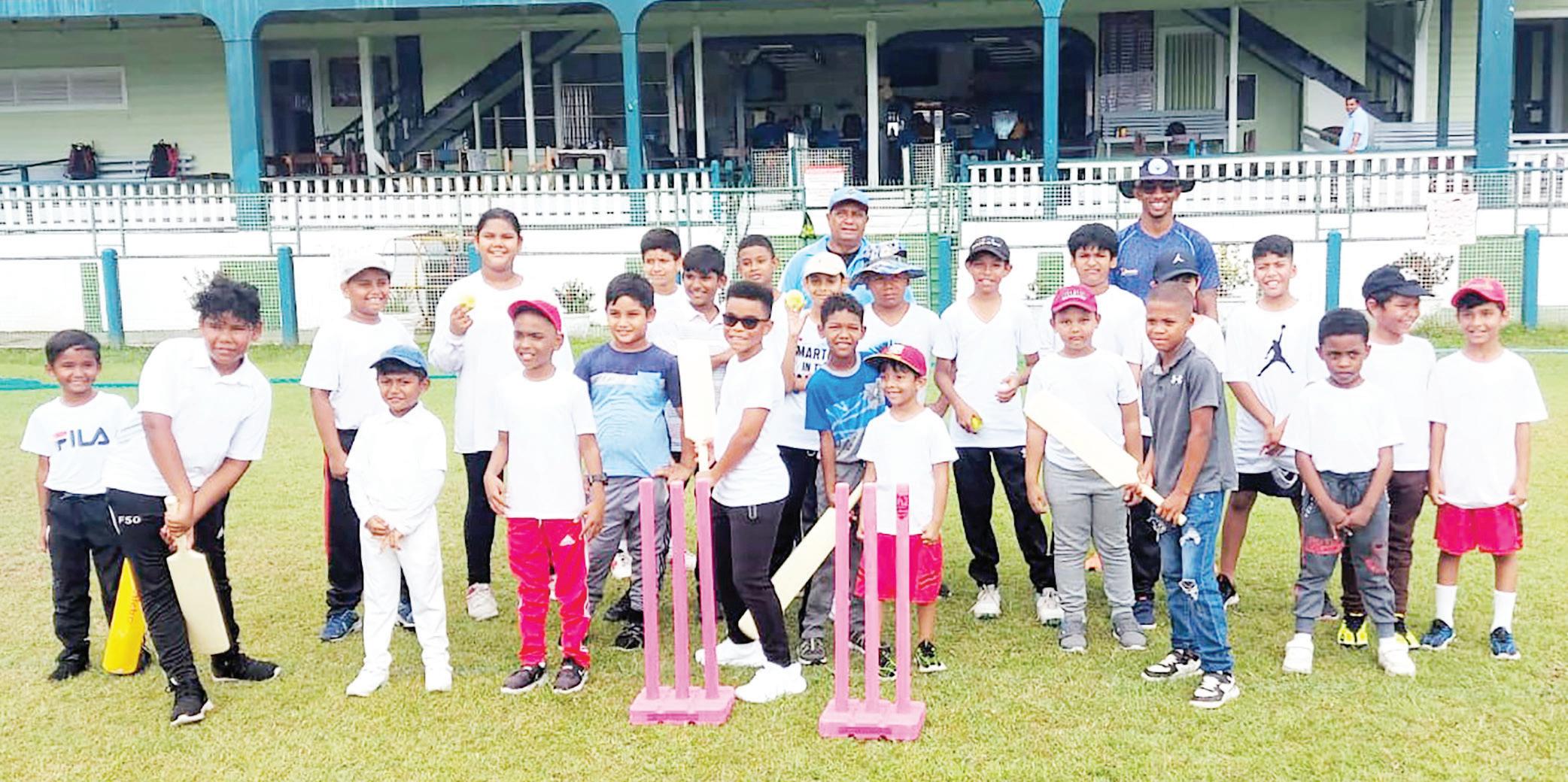








— Minister Manickchand says — aquatic therapy pool opened at Turkeyen
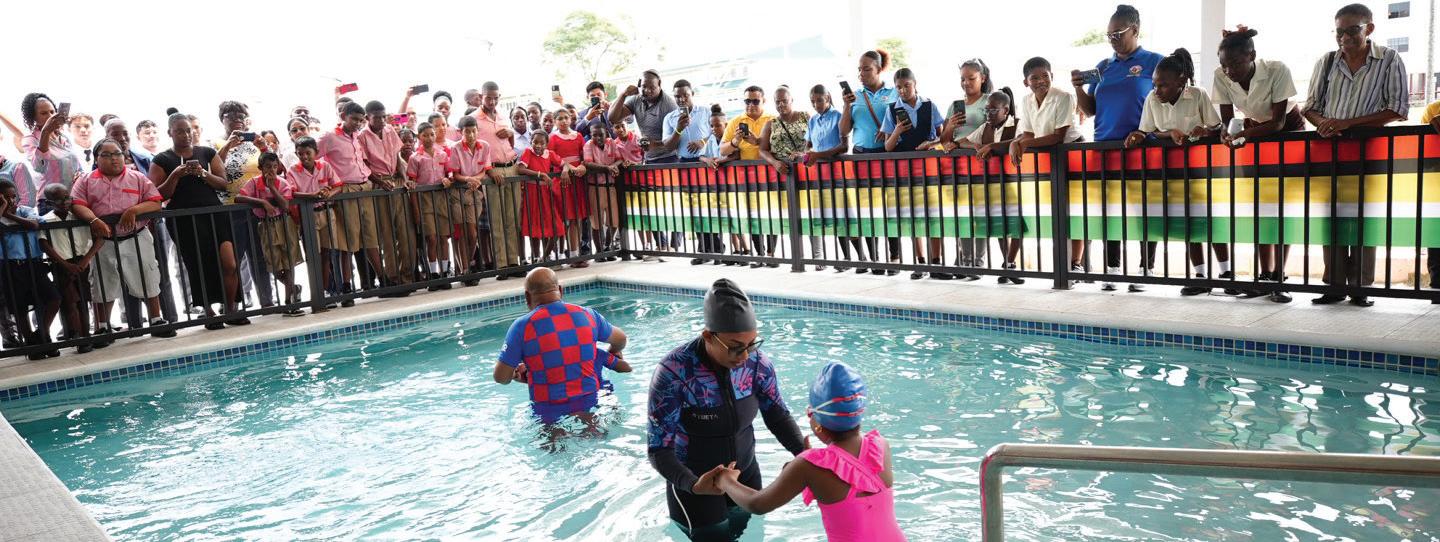
Guyana’s music festival leaves its mark on Cricket Carnival once again
NCN raises concerns over 'worrying' treatment of staff by APNU rep.
Over 3,500 to graduate from UG in November


— Minister Manickchand says — aquatic therapy pool opened at Turkeyen
By Shaniya Harding
THE Ministry of Education has teamed up with Trinidadian businessman and bookstore owner Terry Mohammed on a significant initiative to enhance opportunities for children with special needs.
On Saturday morning, the ministry inaugurated the Edward Mohammed Swimming Pool, named in honour of Mohammed's son, Edward, who was born with retinal damage. Situated at the Ministry’s Special Education Needs Unit in Turkeyen, the pool is designed to meet the unique needs of children with disabilities.
Mohammed, who owns Caribbean Educational Publishers, reflected on his motivation for this initiative, stating that, “I wanted to know what I could do for the Guyanese children. After discussing with the minister, we came up with the idea of a special swimming pool for these children. And today, it is a reality. My son’s name is Edward, hence why we put the name as Edward Mohammed."
The aquatic facility is currently utilised by 81 learners with special education needs and disabilities. The project, a collaboration between Mohammed’s Bookstore and the government, is one of the many steps being taken to bolster education and

social development across Guyana. Minister of Education Priya Manickchand expressed her gratitude for the contribution, linking it to the broader mission of inclusive development. She reflected on the economic strides the country has made, stating, “We are coming from a place where Guyana was a heavily indebted poor country. We moved into the status of a middle-income country. And I can tell you from a young serving minister what that meant. It meant we didn't have to borrow money anymore to give our children breakfast.”
marking a major leap from the previous 30% a few years ago.
The education minister also emphasized the progress made in teacher training. "We've moved from a place where 33% of our teachers across this country were trained, to a place where we tell you that by next year, 100% of our teachers will be trained or in training,” she said.
Minister Manickchand made it clear that the government’s approach to development places people at the centre. She spoke passionately about ensuring inclusivity, especially for those with special education needs.
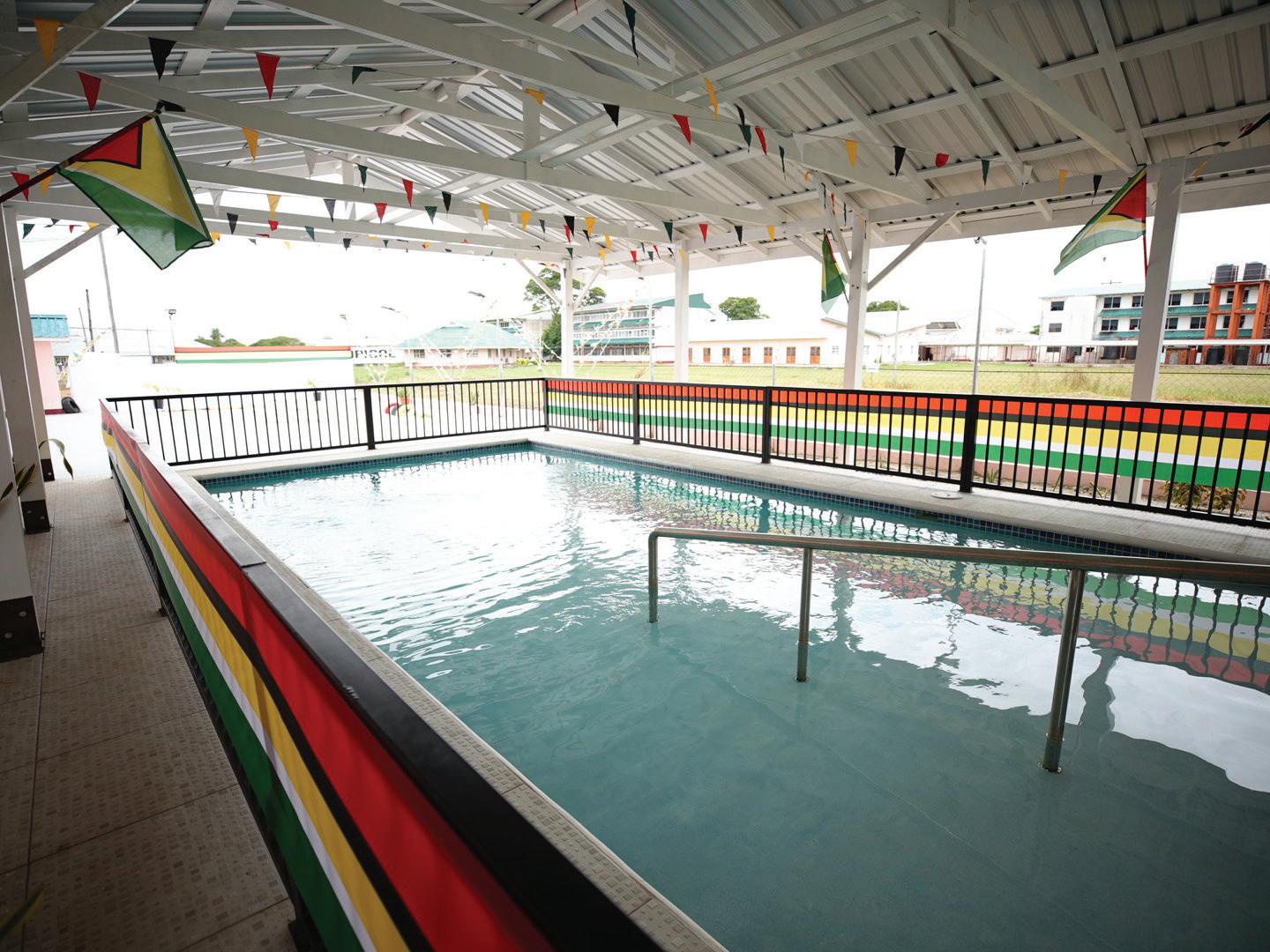
money, people benefit. People's lives improve. And which people? All people,” she stated firmly.
In line with this commitment, the ministry has established special education spaces in 11 classrooms across the country and has launched a programme at the Cyril Potter College of Education to train teachers in special needs education.
"We are not going to leave any community behind in this new Guyana we're building out," Manickchand declared, reinforcing the government’s promise to provide for all citizens, including vulnerable populations.
Looking ahead, the minister unveiled plans for new infrastructure to support vulnerable communities, particularly those with hearing impairments.
“Today, we commit also to building a school for the deaf with all of the acoustics and resources that that school needs,” she said, emphasizing the continued prioritization of investment in education for all.
Manickchand highlighted several key achievements in the education sector, particularly the government’s commitment to expanding access to secondary education.
“By next year, it's going
to be 100% of our children accessing secondary schools,” she announced,
“When Guyana, with the right leadership, gets
Minister Manickchand reiterated the government’s unwavering dedication to the special education needs community. “The special education needs community will never be left behind in this country,” she assured.
(Reuters) - Thousands of protesters took to the streets in major cities around the world on Saturday demanding an end to bloodshed in Gaza and the wider Middle East as the start of Israel's war in the Palestinian enclave approaches its first anniversary.
About 40,000 pro-Palestinian demonstrators marched through central London while thousands also gathered in Paris, Rome, Manila, Cape Town and New York City. Demonstrations were also held near the White House in Washington, protesting U.S. support for its ally Israel in military campaigns in Gaza and Lebanon.
Protesters at Times Square in New York City wore the black-and-white keffiyeh scarf and chanted slogans like: "Gaza, Lebanon you will rise, the people are by your side." They held banners demanding an arms embargo against Israel.
The latest bloodshed in
the decades old Israeli-Palestinian conflict was triggered when Palestinian Hamas militants attacked southern Israel on Oct. 7, 2023, killing 1,200 people and taking about 250 as hostages, according to Israeli tallies.
Israel's subsequent military assault on Gaza has killed nearly 42,000 Palestinians, according to Gaza's health ministry. It has also displaced nearly all of the enclave's 2.3 million people, caused a hunger crisis and led to genocide allegations at the World Court that Israel denies.
"Unfortunately, in spite of all our good will, the Israeli government does not take any notice, and they just go ahead and continue their atrocities in Gaza, now also in Lebanon and in Yemen, and also probably in Iran," said protestor Agnes Kory in London.
"And our government, our British government, unfortunately is just paying lip service and carries on supplying weapons to Israel,"


In London, counter-demonstrators waved Israeli flags as pro-Palestinian marchers walked by. There were 15 arrests on the sidelines of the protests, according to police, who did not specify whether those detained were from either group.
In Rome, police fired tear gas and water cannons after clashes broke out. Around 6,000 protesters defied a ban to march in the city centre ahead of the Oct. 7 anniversary of Hamas' attack.
In Berlin, a protest drew about 1,000 demonstrators with Palestinian flags, who chanted: "One Year of Geno-
German demonstrators also criticised what they called police violence against pro-Palestinian protesters. Israel supporters in Berlin protested against rising antisemitism. Scuffles broke out between police and pro-Palestinian protesters.
Over the past year, the scale of the killing and destruction in Gaza has drawn some of the biggest global protests in years, including in the U.S., that saw weeks of pro-Palestinian college campus encampments.
Advocates have raised concerns over alarming antisemitic and Islamophobic

rhetoric in some protests and counter-protests related to the conflict. Rights advocates have warned about rising threats against Muslims and Jews around the world.
Israel's supporters have expressed offence over some slogans that they say question Israel's right to exist as a nation. Pro-Palestinian protesters point to violence such as an incident in which a mob in California attacked an encampment of demonstrators in April.
The war in Gaza has spread through the region, drawing in Iran-backed groups in Lebanon, Yemen and Iraq. Israel has sharply escalated a campaign in recent weeks in Lebanon that has killed hundreds, wounded thousands and displaced over a million. Israel says it is attempting to dismantle Lebanese Iran-backed Hezbollah militants.
Iran launched a barrage of missiles against Israel this week to which Israel has not yet responded. Israeli operations have also escalated in the Israeli-occupied West Bank since the start of the war in Gaza.
In Paris, Lebanese-French protestor Houssam Houssein said: "We fear a regional war, because there are tensions with Iran at the moment,
and perhaps with Iraq and Yemen." Houssein added: "We really need to stop the war because it's now become unbearable."
Israel has faced wide international condemnation over its actions in Gaza, and now over its bombarding of Lebanon. Prime Minister Benjamin Netanyahu says his government is acting to prevent a repeat of the Oct. 7 assault by Hamas and Washington says it supports Israel's right to self-defence.
U.S. government agencies warned on Friday that the anniversary of Hamas' Oct. 7 attacks may motivate individuals to engage in violence. Officials in some states, including New York, raised security measures out of caution.
In Manila, activists clashed with anti-riot police after they were blocked from holding a demonstration in front of the U.S. embassy in the Philippine capital against Washington's support for Israel.
International diplomacy backed by the U.S. has so far failed to clinch a ceasefire deal in Gaza. Hamas wants an agreement that ends the war while Israel says fighting can end only when Hamas is eradicated.

THE benchmark for world food commodity prices saw its fastest increase in 18 months in September, with quotations up for all covered commodity groups, led by sugar, the Food and Agriculture Organisation of the United Nations (FAO) reported Friday.
The FAO Food Price Index, which tracks monthly changes in the international prices of a set of globally-traded food commodities, averaged 124.4 points in September, up 3.0 per cent from August, and 2.1 per cent higher than its corresponding value a year earlier.
The FAO Sugar Price Index registered the largest increase in September, rising by 10.4 per cent. This was driven by worsening crop prospects in Brazil, and concerns that India’s decision to lift restrictions on sugarcane use for ethanol production may affect export availabilities from the country.
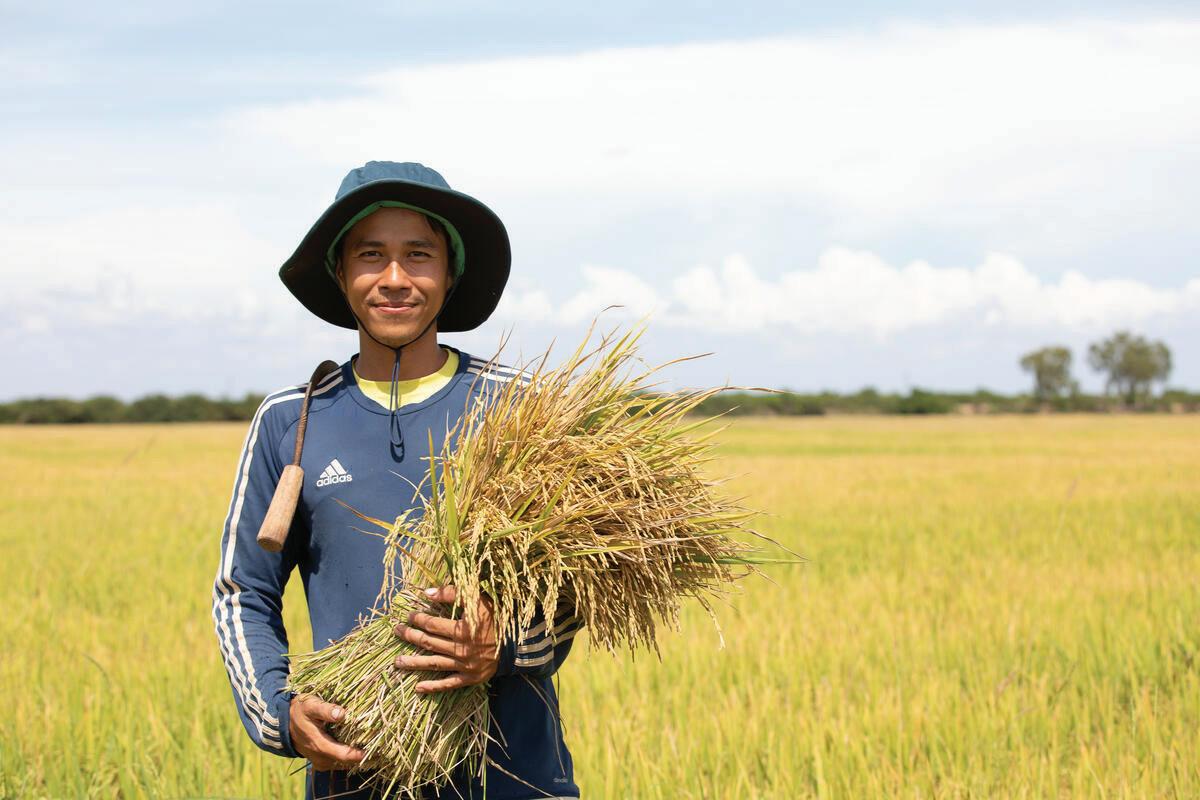
cast due to excessively wet conditions. By contrast, global production of coarse grains is now expected to decline by 0.8 per cent from 2023, with smaller crops in the European Union foreseen to outweigh higher maize output anticipated in the United States of America. World rice production in 2024/25 is now forecast to rise by 0.9 per cent, and reach a historical high of 539.2 million tonnes.
The FAO Cereal Price Index increased by 3.0 per cent during the month, led by higher wheat and maize export prices. International wheat prices increased due largely to concerns over excessively wet conditions in Canada and the European Union, though this was partly offset by competitively priced supplies from the Black Sea region. World maize prices also climbed, influenced by low water levels on key transportation routes along the Madeira River in Brazil and the Mississippi River in the United States of America. By contrast, the FAO All Rice Price Index declined by 0.7 per cent, partly reflecting generally quiet trading activities.
prices was due to lower-than-expected production in major Southeast Asian producing countries, while the rebound in soyoil quotations was primarily due to lower-than-expected crushings in the United States of America.
The FAO Vegetable Oil Price Index increased by 4.6 per cent from August, with higher quotations across the board for palm, soy, sunflower and rapeseed oils. The rise in international palm oil

The FAO Dairy price Index rose by 3.8 per cent in September, with quotations up for whole milk powder, skim milk powder, butter and cheese.
The FAO Meat Price Index increased by 0.4 per cent, mainly due to higher poultry meat prices
driven by strong import demand for Brazil’s product. World bovine and pig meat prices remained stable, while those for ovine meat declined slightly from August levels.
2024/25 forecasts raised for global rice output and trade FAO raised marginally its forecast for global cereal production in 2024 to 2 853 million tonnes, reflecting upward revisions to rice and wheat outputs that outweighed a small reduction made to global coarse grains production. The new figure, also pub-

lished on Friday in the new Cereal Supply and Demand Brief, remains moderately below the record output of 2023.
World wheat production is expected to increase by 0.5 per cent in 2024 from the previous year, as improved yield prospects in Australia more than compensate for a significant cut to the European Union’s fore -
World cereal total utilisation is forecast to rise by 0.4 per cent to 2 853 million tonnes in 2024/25, while global cereal stocks are predicted to expand by 1.2 per cent, with rice stocks seen increasing three times faster. This results in a global cereal stocks-to-use ratio of 30.6 per cent, which FAO considers “adequate supply prospects in the new season.”
International trade in cereals is now forecast at 488.1 million tonnes, representing a 2.7 per cent contraction from the 2023/24 level. However, it is seen that increasing imports by Africa and Near East could spearhead a recovery in international rice trade in 2025. (FAO)


THE recent remarks by Opposition Leader Aubrey Norton, suggesting that the People’s Progressive Party/Civic (PPP/C) pays Afro-Guyanese to “beat up” Indo-Guyanese at street protests, reveal a disturbing pattern within the leadership of the People’s National Congress-Reform (PNC-R).
Such divisive and inflammatory rhetoric does not reflect a genuine commitment to the advancement of Afro-Guyanese; rather, it underscores a disconcerting attempt to manipulate racial tensions for political gain.
As PPP General Secretary Bharrat Jagdeo rightly pointed out during a recent press conference, Norton’s words not only insult the integrity of Afro-Guyanese men but also expose the PNC-R’s preference for maintaining the status quo—keeping young Afro-Guyanese trapped in a
Dear Editor,
cycle of victimhood and dependency.
Jagdeo’s critique was a timely reminder of the responsibility political leaders have to unite rather than divide their people.
By casting Afro-Guyanese as mere pawns in a racially charged narrative, Norton and his party reveal a lack of genuine concern for the well-being and progress of this community.
One only needs to look at the PNC-R’s actions while in government to see the disconnect between their rhetoric and reality. Afro-Guyanese, particularly in communities like Linden, suffered from broken promises and a lack of meaningful opportunities under APNU+AFC’s rule. Jobs were scarce, and housing initiatives that were promised never materialised. As Jagdeo noted, while a select few in the APNU+AFC benefitted, the majority of
Afro-Guyanese were left behind.
The Opposition’s political strategy has been to stoke fears and promote a “victim mentality” among their Afro-Guyanese base. This tactic not only prevents forward movement but also perpetuates a harmful narrative that suggests Afro-Guyanese are incapable of achieving success without political handouts. It’s a narrative that denies the ambition, intelligence, and potential of young Afro-Guyanese men and women who, given the opportunity, can and will thrive.
In contrast, the PPP/C has made strides in creating opportunities for all Guyanese, regardless of race. By promoting education, skills training, and entrepreneurship, they are empowering Afro-Guyanese youth to dream bigger and achieve more. This stands in stark contrast to the PNC-R’s re-
liance on outdated, divisive tactics that do little to uplift their constituents.
The PNC-R and its leadership, instead of evolving with the times and addressing the real needs of their supporters, cling to racially charged rhetoric that has no place in modern politics. Norton’s comments are emblematic of a party bereft of new ideas and desperate to maintain relevance by any means necessary. But as the country grows and progresses, so too should its politics. It is time for the PNC-R to rise above racial divisiveness and offer real solutions for all Guyanese, including those they claim to represent.
Even within their own ranks, there are dissenting voices. Opposition parliamentarian Jermaine Figueira’s refusal to engage in “dog-whistling and race-baiting” is a breath of fresh air, but his removal
from key positions within the party highlights the PNC-R’s unwillingness to embrace progress. Figueira’s call for unity and his rejection of petty political tactics reflect the sentiments of many Guyanese who are tired of being manipulated by politicians and yearn for real, meaningful change.
The PPP/C, led by Jagdeo and President Dr. Irfaan Ali, continues to demonstrate that they are focused on building a nation that benefits all its citizens. From record-breaking economic growth to significant investments in housing, infrastructure, and education, their efforts are translating into tangible improvements in the lives of everyday Guyanese. Jagdeo’s assertion that the PPP/C works for “all of Guyana” is not mere rhetoric—it is a reflection of the party’s inclusive vision for the country.
The time has come for
the PNC-R to move beyond its divisive past and offer something more than empty promises and racial fearmongering. Guyana is at a crossroads, and the future belongs to those who seek unity, progress, and opportunity for all. It is a future that cannot be built on the back of division and mistrust, but on the foundation of mutual respect and shared prosperity.
In the end, it is the Guyanese people, especially the young Afro-Guyanese men and women, who will determine the nation’s future. They deserve leaders who believe in their potential and are willing to invest in their growth, rather than those who seek to exploit them for political gain. The PNC-R must either step up to this challenge or risk becoming irrelevant in a country that is rapidly moving forward without them.
regulations & laws have to be strictly complied with by all businesses
I REFER to a letter published in the Kaieteur News edition of October 5, 2024, with the caption “Regulation, not restriction, is a sovereign right and necessity to justly and fairly protect and preserve Guyanese businesses”, by Professor Dr. Stanley Paul. The author was responding to Vice President, Dr. Bharrat Jagdeo where he stated at his last press conference, among other things, that it would be discriminatory to impose restrictions to the Chinese on the basis of their nationality. The Vice President was at the time speaking to concerns that surfaced in the media from some quarters in the private sector, relating to the increasing presence of
Chinese supermarkets, in particular, and the notion that this trend is displacing local businesses.
Unfortunately, it would appear that Prof. Paul may have only read the “headline” on the subject carried by Gordon Moseley’s (News Source), thus he may not have had the benefit of the full and correct context of the Vice President’s statement. The very premise of Prof. Paul’s letter is exactly what the Vice President has asserted―that the rules, regulations and the laws have to be strictly complied with by all businesses, the Chinese included, and he also acknowledged that there are issues where some businesses are not complying with the regulations and that in those instances, there will have to be measures in place to ensure full compliance.

The concern about the increasing Chinese presence in Guyana has long been surfacing within certain quarters of the private sector. However, to date there is no study done by any of the private sector agencies that I am aware of, to empirically justify their case. Hence, I do agree with the Vice President that as country that practices the principles of a free market economy, that we cannot arbitrarily discriminate against the Chinese.
Furthermore, since we are raising concerns about one group of people, what about the others, for example, the Trinidadian conglomerates in Guyana, the Massy’s and the Ansa Mcals, should restrictions be imposed on them too? What about if Home Depot wants to come to Guyana? Should the Government
prevent Home Depot from entering the Guyanese market?
What about if the hundreds of Guyanese businesses in Liberty, Queens, New York, were told that they are displacing Americans, and they were prevented from having businesses there? (The whole of Liberty Avenue in Queens New York is dominated by Guyanese businesses).
More importantly, what about the consumers? What about protection for the Guyanese consumers? Some of those same locals complaining are engaged in price gouging, and if the Chinese supermarkets are helping to stabilise market prices, then so be it; because those very accusations levelled against the Chinese, some of the locals are more guilty of as well, when it comes to compliance with the regulations
and laws, and tax evasion.
The reality is such that the Chinese presence is not the only threat or real threat I should say for the locals. There are more dangerous threats than the Chinese, for instance, the emerging e-commerce industry in Guyana, which is aided by government policy, viz-ὰ-viz, the enactment of several pieces of legislations to accommodate the e-growing commerce sector. Should the government restrict the inevitable rise of e-commerce in Guyana? Absolutely not. Businesses, locals especially, must learn to adapt to the ever-changing environment, and to constantly seek ways in which to build their resilience and become more dynamic. These are the consequential effects of the inevitable transformation taking place in the Guyanese
economy. Complaining would not get you anywhere and that quest to hold onto the old traditional way of doing business, the refusal to accept the new realities of the environment and resistance to change and growth, will become the hallmark for a guaranteed failure in business.
Finally, it is worth reminding ourselves that Guyana is a country of six peoples, which we are proud of, the Chinese included. As demonstrated herein, the issue is much more complex than the case currently being made out by the complaining parties, therefore, the Government cannot arbitrarily, unfairly and unjustly target one group of people.
Sincerely, Joel Bhagwandin
FORMER President and Prime Minister, Samuel Hinds, has written a letter on the need for Guyana to welcome the oil revenues it is receiving. At a time when the two private newspapers that are shamelessly political in their journalism, are anti-oil and certain civil society Guyanese groups in and out of the country are anti-oil and are being given widespread latitude to condemn the government on everything the government does, it was brave for Mr. Hinds to publish his letter praising the oil revenues we are getting.
I was brought up in abject poverty in this country. I know what it is like to go hungry for years. I came out of poverty and reached the level of being a lecturer at Guyana’s only university. Those 26 years of teaching at UG was a miserable episode in my life. UG was bereft of everything except the grass on the parapet. After the death of Burnham things began to improve and we could now have printing paper at UG.
President Hoyte began to change the statist nature of the economy and sought
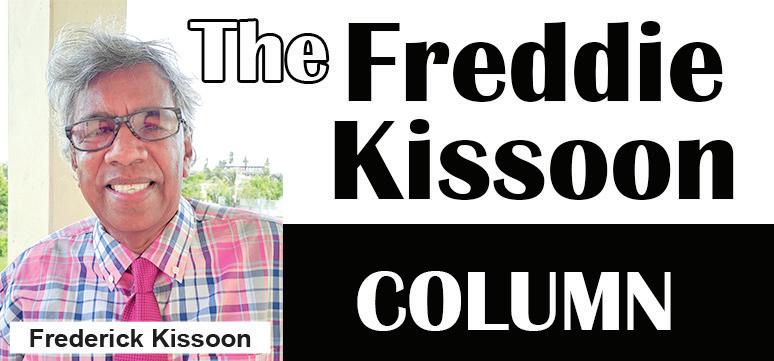
foreign investors of which 3 stood out, GTT, Omai, Barama. In all three situations, the foreign investors were no fools. They did political risk management analysis and they knew Guyana was a country that desperately needed foreign-based capital. All three investors bargained with the Hoyte Government to their advantage.
The Hoyte administration needed the international political credibility that came with the injection of foreign capital. For a presentable account of the disadvantage the Hoyte Government faced in negotiations with foreign capital during the era of economic decline see the book, “Structural Adjustment and Good Governance: The case
The wealthiest multinational corporation in the world, ExxonMobil began to drill for oil in Guyana and found it. Before we move on, a reminder of what Vice-President Bharrat Jagdeo said publicly over Kaieteur Radio. He said the combined assets of all the commercial banks would not be even near the amount ExxonMobil has expended for oil production in Guyana.
In this context, let’s quote Mr. Hinds: “Exxon has had to look about a mile and a half through the water to the bottom of the sea, and a further mile and a half into the rocks to the oil-bearing strata; and had the knowl -
edge to now recover the oil from such a depth in such a location; and was able to accumulate, and riskily venture that money, the capital, to do it. I would prefer to have my people feeling challenged, learning and knowing how these things are accomplished – it is in becoming knowledgeable and capable and accomplishing that we become empowered. Also, when we know, it is easier for us to reach agreement and have satisfactory partnerships with others, and with less than a million people we Guyanese need to become good at making partnerships with others in this world of eight billion souls.”
This is a good presentation that the young people
need to know about. We need the frequency of such outputs because they educate people and they offer a credible, intellectual and political counter to the propaganda and emotionalism of ignorant people.
I feel no restraint in using the word “ignorant” to describe two sets of attitudes to the production of oil in Guyana. One is that oil is detrimental to the climate and Guyana should stop it. The other is that it was a skewed contract and Guyana should demand renegotiations. I had contended in several columns that these pronouncements are by people who have no training in international political economy.
To understand why Guyana needs revenues from oil and should continue with it, one needs to understand international political economy. To understand why a small country like Guyana with hardly any latitude to manoeuvre in international affairs thus cannot make demands on EXXON, one has to understand international political economy. I have submitted that both sets of anti-oil groups are ignorant of international political economy.
I will offer three examples of how important it is to understand the lack of maneuverability of small states in international relations. One is that the WTO was created by the huge developed Western countries with a complete absence of CARICOM negotiators at the table. Two is the ongoing trade/financial/aid covenant between the former colonies and the European Union in which the pact between the two inevitably favours the EU. The third one is the impotence of the UN in global affairs since the committal of genocide in Gaza.
Those who cry for renegotiations are foolish people looking for publicity. Mr. Hinds is right. Guyana should be thankful for at last getting something from the world that we so long dreamt of but so long denied us. The colonial mentality comes in different guises.
DISCLAIMER: The views and opinions expressed in this column are solely those of the author and do not necessarily reflect the official policy or position of the Guyana National Newspapers Limited.

GUYANA’S decision to produce oil and gas is rooted in an urgent need to develop. ExxonMobil’s discovery of 11.6 billion oil-equivalent barrels offshore has inspired optimism, offering the country a once-in-a-lifetime chance to transform its economy. After decades of being one of the poorest countries in the Western Hemisphere, oil revenues are allowing Guyana to begin transforming its economy. The country, which started oil production only five years ago, now stands at a crossroads, with human development, infrastructure, and healthcare needs that demand immediate attention.
The oil and gas sector offers financial resources to address these needs. Guyana’s
infrastructure is in dire need of improvement. The country needs roads and bridges to boost connectivity, enabling the movement of goods and people, which is essential for economic growth. The government has already begun investing in such projects, but much more needs to be done, and oil provides the capital. Guyana’s education and healthcare systems also stand to benefit greatly from oil. The country has a strong reputation for producing some of the top-performing students in the Caribbean, but vast inequalities persist, with many students struggling to pass essential subjects like Mathematics and English. To address these disparities, Guyana needs significant investments in educational infrastructure, ensuring that
all students have equitable access to resources and opportunities. Similarly, while Guyana offers free healthcare through its hospitals and clinics, the quality and efficiency of these services require improvement. With oil money, the government has already begun constructing new hospitals and schools, among other things, to improve access to education and healthcare across the country. These developments demonstrate the critical role that oil revenues have already begun to play in meeting Guyana’s human development needs. For too long, Guyana has also struggled with power instability, an issue that has stunted its economic growth. Now, the country is using oil revenues to invest in energy projects and upgrade
its transmission infrastructure. The most transformative of these investments is the Gas-to-Energy project, which will utilise Guyana’s offshore natural gas to deliver cheaper and more stable electricity to its citizens. This project is a game-changer.
In addition to addressing the country’s immediate energy needs, oil revenues have also created fiscal space for the government to invest in renewable energy projects. While oil revenues themselves may not fund these initiatives directly, the financial flexibility they provide allows Guyana to invest other resources, like carbon credit sales, into projects aimed at renewable energy and climate adaptation. As a low-lying coastal state vulnerable to flooding, Guyana faces an existential threat from climate change. Rising sea levels and natural disasters like wildfires impact the government’s ability to protect its population. The country must
make significant investments in climate resilience, and oil provides the means to fund these critical adaptation and mitigation efforts.
Opponents of oil and gas production in Guyana argue that the country risks unleashing a “carbon bomb” by producing so much oil, contributing to global emissions. However, Guyana’s oil is of a higher quality than many other crudes, and it generates fewer emissions when burned. The reality is that the world will still need oil and gas for several decades while building the capacity to meet its energy needs with renewables. In this transition period, countries like Guyana, which have cleaner-burning crudes, will need to take the lead as the last producers in the energy mix. Guyana is positioning itself to fulfill this role.
Moreover, Guyana has learned valuable lessons from the mistakes made by industrialized nations. Unlike the
United States, which continues to engage in fracking, and China, which relies heavily on coal, Guyana is committed to producing oil in a way that minimises environmental harm. The country’s leadership understands the importance of protecting the environment while securing economic benefits for its people.
As President Irfaan Ali and Vice President Bharrat Jagdeo have noted, despite promises of aid from the developed world to help countries like Guyana adapt to and mitigate the effects of climate change, that aid has not materialised at the necessary scale. Guyana cannot afford to wait for assistance. The oil and gas sector provides the capital Guyana needs to build a world-class standard of living for its people. It must do so now.
DARK clouds have been hanging over Gaza and the West Bank for a year now. The only useful exercise the international community and media networks can perform, it appears, is to count the dead and report the grotesque statistics with precision, as if death and suffering on this scale can be measured in numbers.
There have been countless speeches and boycotts against Israel that no one in my generation has ever witnessed. The global student protests condemning what Bob Dylan’s classic 1962 song dubbed the “Masters of War” have made not an iota of a difference. That includes the hundreds of
thousands of Israelis who have taken to the streets in Tel Aviv and Jerusalem to demand their government agree to a ceasefire that would bring the hostages home.
As well, a mountain of diplomatic engagements from the majority of nations including our own, literally pleading for a ceasefire and a “Peace Train to take us home again” that Yusuf Islam (Cat Stevens) gifted us in 1971, and still, the slaughter of Palestinian lives continues unabated.
As we journey “deeper and deeper into the heart of darkness,” to quote Joseph Conrad, political scientists are no longer talking about state and non-state sanctioned

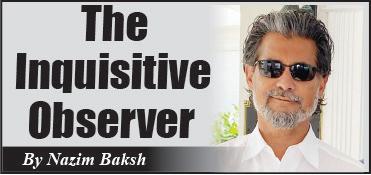
violence, but rather about state and non-state sanctioned brutality. The International Criminal Court (ICC) has weighedin as well, issuing arrest warrants for Israeli Prime Minister, Benjamin Netanyahu, and his Minister of Defence, Yoav Gallant, on grounds that they and leaders of Hamas have committed war crimes.
Instead of halting Israeli genocide in Gaza and allow Hamas to free their hostages, the war has expanded into the densely populated city of Beirut and we are witnessing political assassinations at a scale the world has not witnessed in decades. With Hamas

and Hezbollah in complete tatters, who is left for Netanyahu and his war cabinet to negotiate peace with?
Netanyahu and his coalition government must know that in committing genocide against the Palestinians, they’re engaging in an act of suicide against their own government. It is the only angle in this carnage that the major international media networks have by and large ignored. What price is Israel paying for the thousands of bombs it has dropped on innocent people in the territories it has occupied long before Oct. 7, 2023?
Shir Hever, a prominent Israeli political economist, believes Israel cannot rescue itself from the debris of Gaza, the West Bank and Lebanon. Israel is a country hurtling towards collapse and it will not survive in its current form. Headlines in major Israeli newspapers are routinely ignored by Western media outlets - “The Collapse of Zionism,” “Zionism has failed.” “Will Zionism survive the war?” Israeli historian, Yuval Noah Harari, wrote recently that “Netanyahu is endangering Israel’s survival.”
Historians across the Israeli political spectrum - Zionists and non-Zion-
ists - recently penned an essay published in both English and Hebrew by Haaretz. The title of the essay: “Will Israel reach its 100th anniversary.”
The state is only 76 years old. The English version reads: “Israel is headed for a historic defeat.” The Hebrew version is a lot more bleak: “we will die with the Palestinians.”
The authors made the following prediction: “a state that gives privilege to one ethnic religious group and doesn’t give equal rights to others is coming to an end.”
Israelis don’t like using the term apartheid. Instead, they use the Hebrew term “hafrada” which means separation. Same thing, as Ta-Nehisi Coates brilliantly outlines in his new book “The Message.” Every major sector of Israeli society is experiencing an unprecedented crisis that is already ripping apart the fabric of its society.
A global boycott of Israeli academics caused the European Union to issue a warning to universities not to terminate Horizon Europe projects with Israeli counterparts. Horizon Europe is the EU’s key funding programme for research and innovation. Israeli scholars are no longer receiving invitations to
attend conferences and academic publications are refusing to publish the submissions of Israeli academics.
Even the formidable high-tech sector in Israel is on the brink of collapsing as foreign investments are directed elsewhere. In June this year, Intel Corp announced it was cancelling plans to build a $25-billion chipmaker factory in Israel.
The Times of Israel newspaper has reported that well over 60,000 Israeli businesses will be shuttered by the end of 2024. One in ten Israeli hotels are on the brink of declaring bankruptcy as Israel’s tourism industry is being obliterated.
Half a million people have already fled, marking a 285 percent spike in departures. No one really knows the exact numbers. Airports report the number of people departing, but the Population Registry and the National Insurance Agency give wildly different numbers. The Central Bureau of Statistics is unable to provide an accurate figure because their researchers have fled. Things are so bad that Israelis are unable to get a doctor’s appointment because the majority of physicians have fled.
There are never any winners in war except perhaps for those who profit from the misery of others.
DISCLAIMER: The views and opinions expressed in this column are solely those of the author and do not necessarily reflect the official policy or position of the Guyana National Newspapers Limited.
Leader Aubrey Norton continued his campaign-styled Town Hall meetings in Canada, where he met with members of the Guyanese Diaspora. He was accompanied this time by Member of Parliament Ganesh Mahipaul, and PNC/R Executive Mervyn Williams.
Norton, seeking to update the meeting on developments in Guyana, said the country was in crisis. He alleged that there was no democracy. The opposition leader said that there was poor governance, and the government was incompetent as far as the management of infrastructure projects and the oil and gas sector were concerned. He further alleged that there was widespread corruption and racial discrimination at the hands of the Ali Administration.
Norton told the group in Canada that the Guyana Police Force was a political tool for the oppression of the enemies of the PPP/C administration. He even alleged that the Police Commissioner (ag), Clifton Hicken was openly campaigning for the PPP. Taking his message further, Norton said the holders of Constitutional Offices here were out campaigning politically for the PPP.
He alleged that poverty was on the increase, and that the current government had no measures to deal with it. He said that the government, if it had cut the waste, could pay the public servants a 35 per cent increase, and that his government plans to give schoolchildren two hot meals per day, should it win the next election. He criticised the education sector matriculation rates, stating that the government was allegedly incompetent and not getting to the bottom of the problem eating away at the fabric of education in Guyana.
He said that the former APNU+AFC government, during the period 2015 –2020, promoted racial unity and togetherness. Norton told the group there were no reports of racial hostility and discrimination during that
time. He even alleged that Guyana was not experiencing blackouts at the time, and the Police was solving crimes unlike now.
The opposition leader said that, “Street protests are not the best options” at this time. He boldly added that the PPP government was “paying young Afro-Guyanese to beat Indians”, then blame it on the APNU+AFC opposition. He said that the PPP/C wanted conflict between races, but did not rule out protests, once they would achieve the desired goals.
The opposition leader said more, along with the usual rants and political cussout of Mahipaul and Williams.
Firstly, it comes as no surprise that the opposition leader and his handpicked minions would seek to launch a campaign of mistruths, lies, misinformation, and half-way facts to the Guyanese Diaspora in Canada. They have been doing so since 2020 when this PPP government came to power after fighting for democracy and against rigged elections for five long months.
The opposition leader now wants to go to Canada, and everywhere where they would have him, to paint a poor picture of Guyana. Norton cannot be so foolish as to think that he or anyone of his opposition members could walk away without members fact-checking them. After all, this is the age of social media and the Internet.
Norton lied at least 40 times when he delivered his analysis of the situation in Guyana. Norton twisted the truth at least 50 times when he sought to update the Guyanese Diaspora in Canada. He deceived the audience 20 times while speaking, trying hard to play on the people’s sympathies and emotions.
To give an example of Norton’s deception, one must look and listen to his speech carefully. He said that constitutional office holders and the Acting Commissioner of Police were out campaigning for the PPP/C. Lies.
There is no constitutional


office holder engaged in any political campaigning. The PPP would make the person resign before they make the move. He lied again on the Acting Commissioner, who has done no wrong except serve his country by making sure the country has security and is able to fight crime.
The opposition leader said that poverty was on the increase, but failed to give a detailed or precursory explanation. By how much has it increased? During which years? How many people are living below the poverty line in Guyana, and how many in extreme poverty? This is a politician that wants to lead Guyana?
According to the World Bank Country Report of 2020, “Guyana has experienced a decline in poverty over the past decade from 60.9 per cent in 2006 to 48.4 per cent in 2019, using a poverty line of US$5.50 per day in 2011... While the oil and non-oil economy has grown enormously since 2020, recent data to monitor progress in poverty reduction is not available.”
Norton has to stop lying, and present the facts or inconvenient truth.
Secondly, in his attempt to sound grounded and academic, he said the APNU+AFC promoted national unity and togetherness. Yes, in slogans, and not in practical terms. The years 2015 - 2020 August saw more than 7,000 sugar workers losing their jobs, and left 45000 people without a back-up plan.
It saw countless demon-
strations by teachers, nurses and public servants for better wages. It experienced the highest taxation rates when the government strangled the population. Ethnic and race relations were at its poorest in a decade, leaving Guyana on the cusp of ethnic explosion because of the repressive policies of the government at the time.
So, Norton lied; the ERC knows that Norton lied.
As for the state of GPL, that would take a whole column to explain the many things that were allowed to take place during the years of APNU+AFC rulership. It is simply not true that Guyanese did not experience blackouts then.
And, Norton told an even bigger lie when he spoke to the countable audience in Canada. In 2024, the Guyana Government allocated approximately $100.5 billion to the education sector. This includes $4.1 billion for the University of Guyana, and $4 billion for the Guyana Online Academy of Learning (GOAL) programme.
The fact remains that education is constantly climbing the ladder of success in Guyana, and access to education is improving at a fast rate. The government is continuously improving students’ performance at the exams, but there are challenges. Norton's explanation for the matriculation rates in education is hogwash, and requires an intellectual analysis if it were to be properly explained.
Thirdly, Norton’s utterances that the PPP govern-

any respect for Norton’s leadership, since he allegedly rigged the internal elections of the party and handpicked the PNC Executive.
ment pays Afro-Guyanese to beat up Indo-Guyanese are as appalling as they are untrue. Where’s the evidence? This is a serious matter, and must not be taken lightly by the PPP and the PPP/C administration. Also, the ERC must demand from Norton an explanation, because he is not saying this in Parliament, where he has the privileges and immunity.
He is saying that the PPP uses Africans to beat up Indians, so as to cause ethnic conflict for political benefit. This is most irresponsible and reprehensible. And, without any evidence.
Norton must think the Guyanese Diaspora is foolish, and trying hard to justify his disgraceful and dark reign over the PNC and APNU+AFC opposition. Surely, he lied through his teeth. He can’t mobilise a proper protest, but relies on sell-out politicians posing as trade union representatives to do so.
Furthermore, no one has
Finally, almost everything that was said in Canada amounted to lies and deception by the opposition leader and his band of merry men. This is the modus operandi of Norton’s party and his politics; he can’t convince the people right here in Guyana of the nonsense he is talking, so he goes abroad to spread his propaganda and wave of misinformation.
When MPs and politicians go abroad and engage supporters in the Diaspora, they are responsible ambassadors of truth. They must not seek to swindle the people of the Diaspora with these fake tales of life in Guyana, and sell these stories of a make- believe dictatorship. Talk the truth and shame the devil.
Norton, Mahipaul and Williams must be somewhere hanging their heads in shame and disgrace, sucking air through a straw in the gutter of politics. Why lie when more than half of our population has access to Google and know how to use it?
DISCLAIMER: The views and opinions expressed in this column are solely those of the author and do not necessarily reflect the official policy or position of the Guyana National Newspapers Limited.

See below full statement issued by NCN:
“THE National Communications Network Inc. (NCN) wishes to address a concerning report about the alleged actions of an A Partnership for National Unity (APNU)-affiliated councillor against a member of our team at the Watooka Guest House, where the Linden Mayor & Town Council’s statutory meeting was held on Wednesday, October 2, 2024.
“The reported incident followed the statutory meeting, where the NCN team was fulfilling its responsibility to cover the event. A disagreement between the Town Clerk and the Mayor had escalated, resulting in the premature adjournment of the statutory meeting.
“Following this, several councillors expressed their frustration as they exited. During
this time, one councillor, Mr. Abdulla Hamid of the APNU, reportedly directed inappropriate language towards NCN’s staff member, Ianna Benjamin, who was simply documenting the proceedings, as is the responsibility of the media, and our duty to the public.
“It is imperative to emphasise that our media personnel, especially our women staff, should
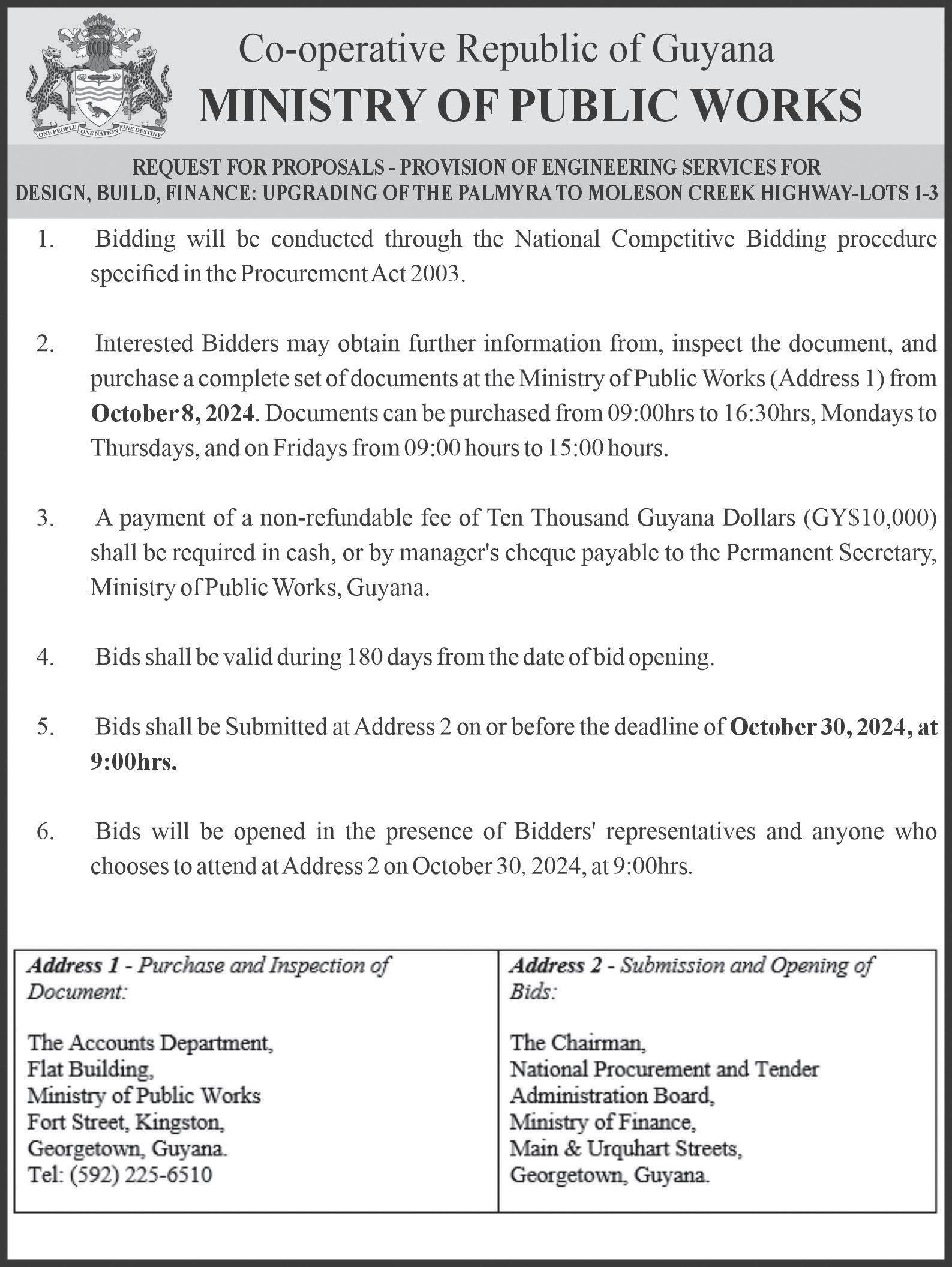
not face hostility or disrespect while performing their duties. Such behaviour, if found to be true, undermines the essential role of journalists in fostering transparency and accountability.
“Unfortunately, we have observed a pattern of unsavoury conduct directed at State media workers by affiliates and proxies of the APNU and the Alliance For Change (AFC).
“NCN will bring this matter formally to the attention of the Guyana Press Association (GPA) in hopes that an investigation will be done, and that action will be taken to promote respect for and protection of the rights of media workers, especially those representing state media.
“We trust that the elected representative in question recognises the essential role of
journalists in fostering transparency and accountability. We have also called on the GPA to underscore the value and right of State media workers to carry out their duties without fear of intimidation or verbal abuse, and we note with grave concern that this is not the first such incident report received which affects NCN’s team in Linden.”

THE University of Guyana (UG) is set to graduate over 3,500 graduands, the largest number in the sixty-one-year history of the university. The nation’s premier tertiary education institution will host its 58th Convocation Ceremonies as follows: for Turkeyen and IDCE Students, the graduation ball will be on Tuesday November 5th, 18:00 hrs to midnight.
The six ceremonies, two on each day, for graduands of the Turkeyen Campus will be held at the University’s newly built Multipurpose Auditorium at the Turkeyen Campus. The ceremony for the UGBC graduands will be held on the University Lawns, Berbice Campus, Tain Settlement and the IDCE extra-mural programmes’ graduation will be held at the Multipurpose Auditorium, Turkeyen Campus.
Prospective graduands are asked to check for information directly via their SRMS. There will also be continuous updates on the university’s website: https://uog.edu.gy/. The ceremonies will be blended with the large majority of the graduands attending face-to-face and the others participating virtually.
It is noteworthy to mention that this year will see several new academic programmes producing graduates for the first time, these include:
• Master of Philosophy (Biodiversity)
• Pharmacy Technician Diploma
• Certificate in Geographic Information Systems
• Bachelor of Science (Environmental Health) (Environmental Engineering)
• Bachelor of Science (Environmental Health) (Food Safety)
• Bachelor of Science (Environmental Health) (Occupational and Health and Safety) and
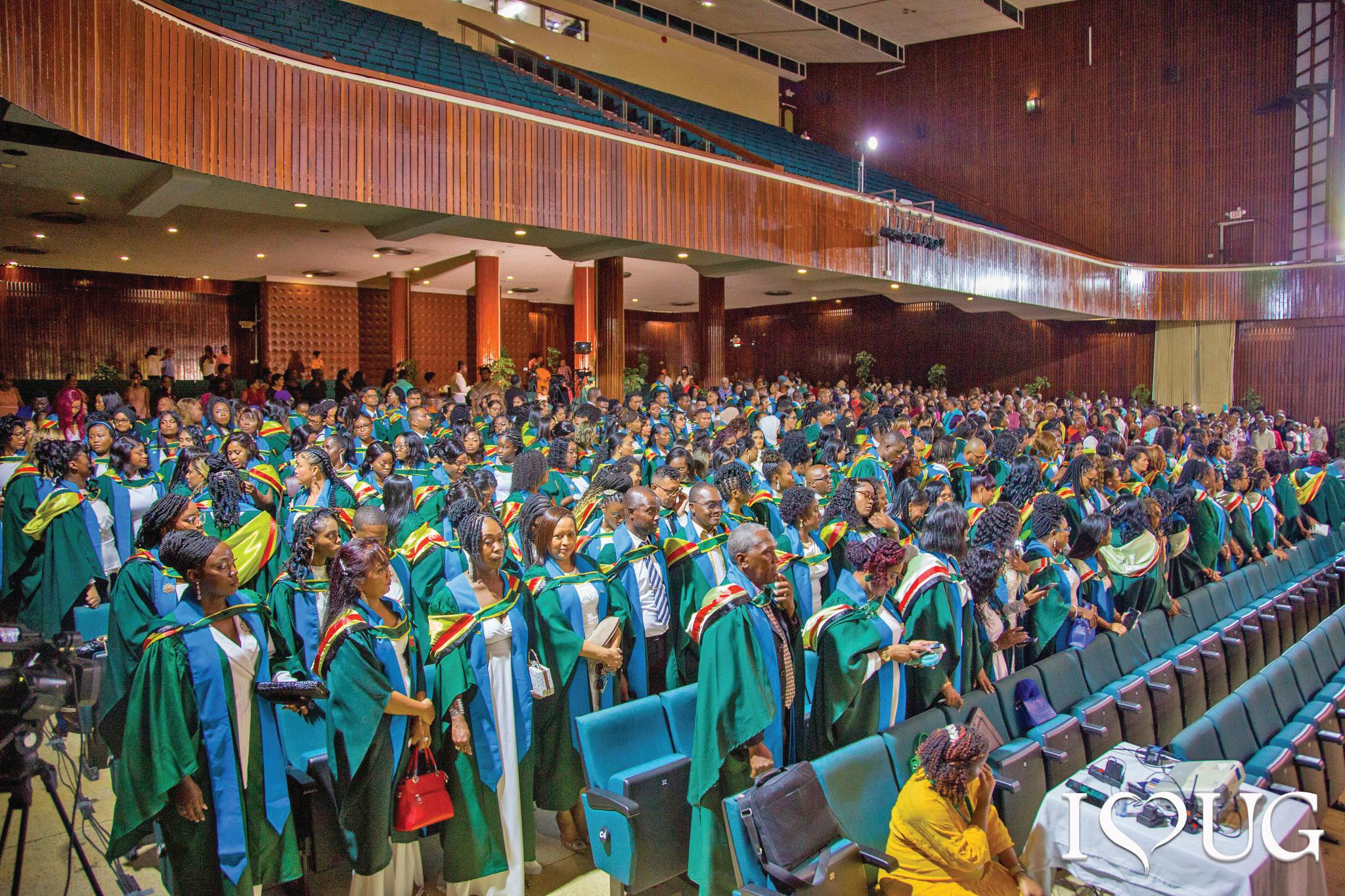
• Bachelor of Science (Environmental Health) (Vector Control)
The university will also confer several Honorary Doctoral Degrees during these special graduation ceremonies.
The public is invited to celebrate with the University of Guyana at this year’s very special graduation events which will be streamed live on the University’s Facebook page: https://www.facebook. com/uniofguyana and UG Broadcasting Service at https://broadcasting.uog. edu.gy/. The ceremonies will also be covered by local and international media.
A press release from the UG noted that this year’s convocation ceremonies are extremely special as the university will be bringing the curtains down to its 60th anniversary celebrations. The university’s role and place as a major development partner and its achievements are highly recognised and honoured locally, regionally and internationally. The University of Guyana
has produced upwards of 60,000 graduates in its 61-year existence - many of whom have gone on to serve at the highest levels in both the private and public sectors nationally and internationally.
See graduation times below:
For Turkeyen and IDCE Students
Graduation Ball –Tuesday November 5th, 18:00 hrs to midnight.
Graduation Ceremonies
Thursday November 7, 09:00 hrs [Faculties of Engineering and Technology. Agriculture and Forestry and Earth and Environmental Sciences]
Friday November 8, 09:00 hrs [College of Medical Sciences, College of Behavioral Sciences and Research, Institute for Human Resiliency Strategic Security and the Future, Friday November 8, 15:00 hrs [School for Entrepreneurship and Business Innovation – SEBI]
Saturday November 9, 09:00 hrs [Institute for Distance and Continuing Education (Intramural), Faculty of Education and Humanities]
Saturday November 9, 15:00 hrs [Faculty of Social Sciences]
University of Guyana Berbice Campus (UGBC)
Friday November 15th, from 18:00 hrs to midnight – [UGBC Graduation Ball]
Saturday November 16th, from 13: 30 hrs. [UGBC Graduation Ceremony]
Institute for Distance and Continuing Education (Extra-mural) –Saturday, November 23, 2024.
Thursday November 7, 15:00 hrs [Faculty of Natural Sciences]
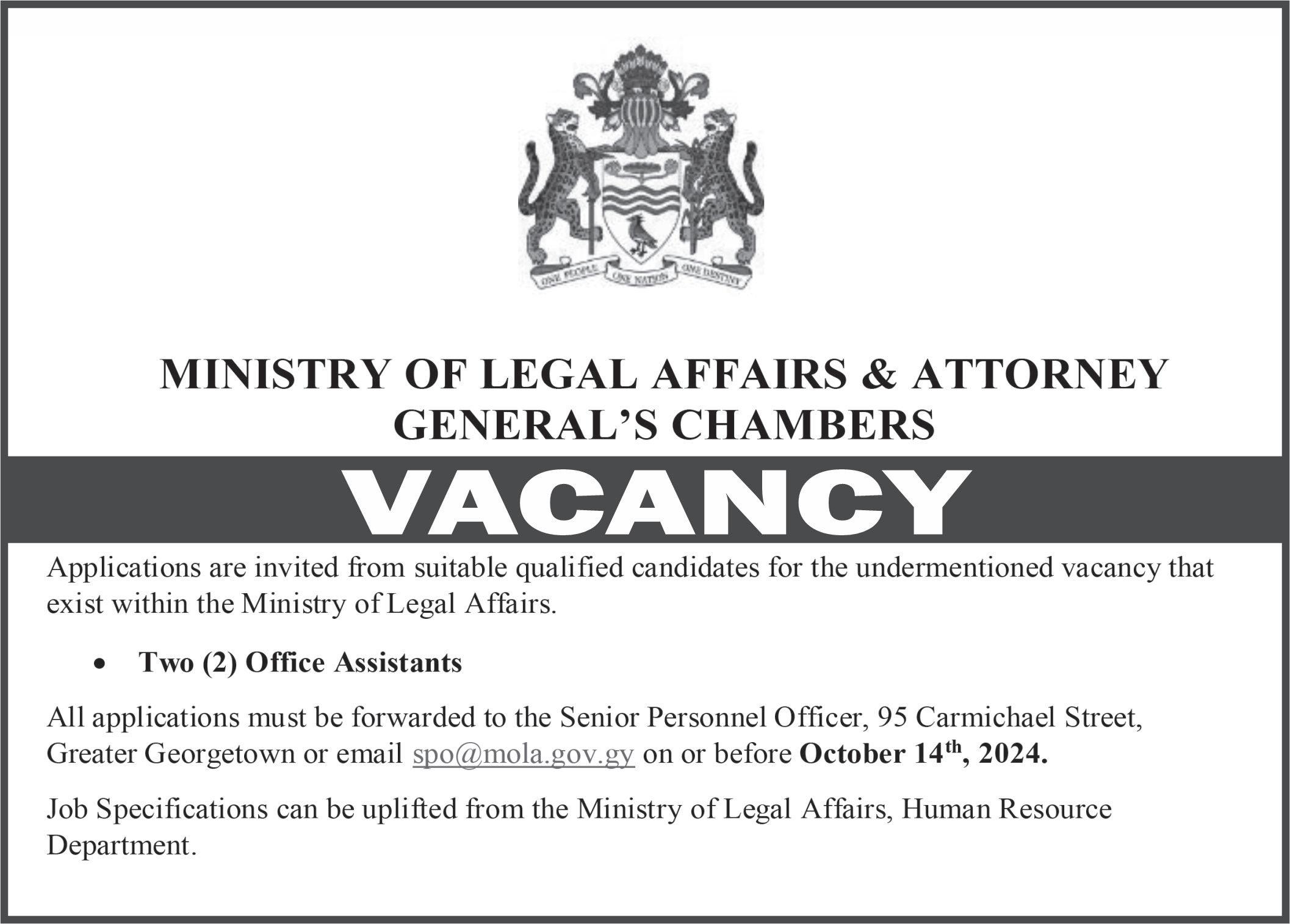
OVER the past four years, the Government of Guyana has been steadfast in its commitment to ensuring youths and all Guyanese are equipped with the necessary skills for employment across various sectors.
In their 2020 manifesto, they promised to promote skills training by increasing technical and vocational training, and apprenticeship schemes, and remove value added tax on data and establish online training programmes countrywide.
Within four years, the government through key sectoral agencies, has done this and more for Guyanese by launching initiatives such as the Women’s Innovation and Investment Network (WIIN)
programme through the Ministry of Human Services and Social Security; the Guyana Online Academy of Learning (GOAL) scholarship through the Ministry of Education and the Ministry of Public Service, and enhancing and expanding programmes offered by the Board of Industrial Training (BIT) through the Ministry of Labour.
In an effort to bring awareness to these programmes in Mocha, a youth outreach was held on Saturday at the Mocha Primary School, East Bank Demerara, where a group of persons gathered to register for courses offered for free through these programmes.
Minister of Local Government and Regional Devel-
opment Sonia Parag attended the outreach and stated that the government aims to bring such initiatives to communities. She emphasised that these programs are not solely for youth; they are open to anyone who believes they can acquire a technical skill or academic qualification.
She said, “We're empowering as we go along, which is the aim of all of this, and to build the human capacity and the human resource capacity that we want. So, these kinds of trainings are targeted towards that, and I'm sure that Mocha will not be the last community that is benefitting from this.”


As they move forward, Minister Parag stated that they will focus on engaging different communities to encourage self-development. She highlighted that while many training opportunities are available through these programs, it’s essential to involve more individuals so that both communities and the country can reap the ben-
efits of these skills.
She also noted the significant number of women enrolling in programs like heavy-duty equipment training through BIT, as well as initiatives through GOAL and WIIN specifically designed for women.
Minister Parag added that several communities have already benefitted from such initiatives, enabling individuals to work in the private sector and become self-employed. Examples include Den Amstel in Region Three, Tiger Bay in Georgetown, and Cotton Tree in Region Five, among others.
“This very Mocha also benefitted the previous years from not only WIIN, but BIT and as well as IT training. And right after the IT training through the Ministry of Public Service, when I was there, we had provided jobs. On the spot jobs to persons who completed the IT training with Qualfon. So I think about 16 persons were able to get employment right after. So the point is to get not only get persons to the point of being trained, but get them to a point as well where they can be absorbed into the world of employment,” she said.

JAMAICA has singlehandedly transformed the Caribbean stock market. Irreversibly. Behind the titanic transformation stands a diminutive, yet gigantic figure – Dr. Marlene Street Forest. She bestrides the financial sub-sector “like a Colossus”.
It was the late British Prime Minister Margaret Thatcher who counselled the world advising that, ‘If you want something said, ask a man; if you want something done, ask a woman”.
Certainly, Jamaica wanted “something done” in their stock market sector and wisely turned to a woman about 25 years ago.
And the transformation led by Dr Street Forrest, Managing Director (MD) of the Jamaica Stock Exchange (JSE). has been magical. Her exceptional insight and foresight in leading the charge was noted by an American firm during an interview five years ago. They characterised the Land of Reggae then as the “Home of the World’s Best Performing Stock Market.”
In 2019 when the interview with the JSE Managing Director was conducted the firm’s interviewer described the Jamaican stock market as “so obscure, even emerging-markets funds don’t go there.”
Nevertheless, the interviewer noted that although nascent market funds avoid participation, the JSE still was “booming”. Driving that flourishing, still, is Dr. Marlene Street Forrest, architect of its local, Regional and global influence, and beneficiary of all the hardships, vagaries and victories over her years there at the helm.
She has witnessed all of these, and more, as a front-seat viewer Street Forest noted in an interview with Business View Caribbean (BVC).
“Over the years, we have expanded our services to the market. At the time I came, we started doing electronic trading and settlement. We now have the Jamaica Stock Exchange and its subsidiary, the Jamaica Central Securities Depository Limited, along with its subsidiary called the JCSD Trustee Services. To ensure we offer full services to our investors and member dealers, we expanded the JCSD to offer registrar services and, based on the subsidy, trustee services,” she reportedly told BVC.
At this year’s annual Summit held at The Jamaica Pegasus Hotel, Dr. Street Forrest, in outlining some challenges the JSE faces as
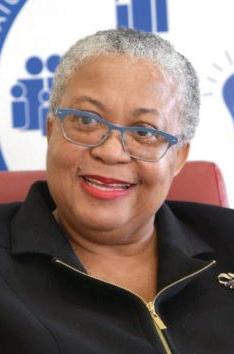
it entered 2024, highlighted under-performance as an issue. Notwithstanding this she forecasts more trading involving government securities, a hike in research leading to more attractive packaging and to boost sales and tapping into available global securities. She even promised that emerging companies getting expert advice and assured improvements to the stock exchange infrastructure.
The Titan in the JSE and Caribbean stock market eagerly anticipates financial literacy as a staple in Caribbean schools’ curriculum from primary to all tertiary institutions.
“We are not in many high schools,” Dr Street Forrest lamented during one of the Q&A sessions at this year’s three-day anniversary event held under the 2024 theme ‘The Drivers of Capital: From Concept to Growth’ in her hometown, Kingston, Jamaica.
She plans urging the local education ministry during next week’s October 8-9 Guyana/Jamaica Capital Markets Conference to introduce comprehensive financial education throughout the Guyanese learning system to help demystify the stock market for learners making it much easier for their participation even before their graduation.
Next week’s joint Conference will be held under the theme ‘Financing For Success: Where Passion, Prosperity and People Align’ at the Pegasus Suites and Corporate Centre, Kingston, Georgetown.
During her more than two-decade tenure at the helm of the JSE Dr. Street Forrest has helped diversify the sector by adding to the main market a junior market, the bond market and the UD Dollar equities market. As part of her wide-ranging vision securities are buttressing those markets, and with the aid of technology, adding an online trading platform to
have a hand in activities on a global scale.
The JSE MD is showing she possesses a nimble mind by staying current on lightning-fast technological changes targeting the younger generation who today can access JSE’s trading platform and interactive website using either an android or iPhone.
In 2024 she has drifted from that position. She told this year’s annual meeting that, “As active participants in the capital markets, we must quickly adapt innovative technologies, and superior services that surpass customers’ expectations and that yield good returns on investments. We really want to do that when the market is up…to get that real return for investors,” the JSE official emphasised.
However, for Dr. Street Forrest, people must not be sacrificed at the altar of technology. “A key emphasis is recognition for human capital which is a key driver for capital market investment. The continued development of our people encompasses our own aspect of capital market and their intersection with technology is critical to our progress. Also, we knew that confidence in our markets is a responsibility that we bear. Therefore, it is important that we be equipped with analytical minds so that we can drive the process of even AI (artificial intelligence),” she said.
More than a decade and a half ago she also helped mastermind tectonic shifts within the JSE moving it from a mutual company to a demutualised Exchange making the regulatory division independent from its commercial compatriot with a self-governing Board of Directors providing muchvalued oversight. “That ensures the maturity of the market and allows us to lead by example in terms of transparency and to bring more confidence in the market,” she explained in the BVC conversation.
The MD is steadfast in her beliefs in good governance; she remains upbeat too about luring more listed companies to participate in the JSE, and she still aches for students to develop a sixth sense about the workings of the stock market discovering it through games they have created expressly for that purpose.
Among the hallmarks of Dr Street Forrest’s morethan-two-decade stewardship at the JSE is protecting the institution from incestuous inbreeding. The award-winning
Kingston stock exchange has remained “outward looking with a global footprint” according to her. It is holding on to the value and confidence circumspectly nurtured in its 54-year existence by continuing to provide “efficient service to the market and the outward
looking strategy is that with each transaction we are working to be that place where our footprint is on every capital market transaction”
Dr Street Forrest said in the BVC interview some five years ago. That still holds true today.
Don’t let the diminutive
stature, sartorial elegance and infectious laughter blind you to the fact that hidden beneath labyrinth of all of these in Shaggy’s globally popular song is ‘the strength of a woman’. That woman is Dr. Marlene Street Forrest who will retire at the end of 2024.

THE Seeing Eyes – Signing Hands (SESH) Inc., led by its founder Tracey Cholmondeley, has profoundly impacted the lives of many individuals in the deaf community. This nonprofit organisation provides educational programs that improve the quality of deaf education, offer sign language training (SLT), and facilitate employment opportunities for deaf workers, along with other specialised training.
SESH is dedicated to im-
proving the lives of the underprivileged, disadvantaged and marginalised. It plays a crucial role in increasing public awareness about the issue faced by deaf persons in society.
Cholmondeley told the Sunday Chronicle that SESH is a shining example of self-sustainability, as it does not depend on funding from the government, but instead is funded through the donations of citizens.
“SESH runs solely on the generosity of individuals,
volunteers, families, friends of friends, organisations and businesses who donate goods to be delivered to the Deaf Awareness Week (DAW) activities which are held once a year or sometimes semi-annually. Proceeds from their fundraising sales and donations go toward providing important educational services for programme participants by helping them get back on their feet and live a productive life instead of depending on or living with their parents or guardians,” she said.


Providing some background on what led to the start of SESH, Cholmondeley said, “It was the Guyana Deaf Mission/Changed Life Deaf Church, run by two Americans, Pastor Lawrence Hallahan and his wife, Mary, who asked me to help them on their first Deaf Awareness Day event held in 2006. At that time, I still resided in the USA and was visiting Guyana on a short summer vacation. They needed my team and me to help by preparing and planning for Guyana’s first Deaf Awareness Week event that followed in 2007.”
She remarked that it was the first time the deaf Guyanese community had the opportunity to hear the diverse experiences of deaf Americans. She emphasised that it was a valuable learning experience and the start of something promising. SESH was subsequently established in 2010 as a 501(c)(3) nonprofit charitable organisation in the United States.
“In July 2016, SESH Inc. – Guyana, a non-profit/
non-governmental organisation, was established and registered under the provisions of the Income Tax Act. SESH was also incorporated under the Companies Act of Guyana in June 2016,” Cholmondeley shared.
She added, “One thing I have discovered through my former sign language participants who wrote a course and instructor evaluation forms is that they would want this SESH Inc to be in more collaboration with the Ministry of Education and conduct a diploma programme in sign language so that more special needs teachers can be trained in sign language to communicate their particular needs or deaf children.”
The founder leads each cohort of students with support from other deaf teaching assistants, substitute teachers, and tutors as needed. Within SESH, Cholmondeley serves as the Managing Director for the Sign Language Community, where she teaches sign language classes.
These classes are held
in person, and deaf instructors educate hearing participants using either the manual method or speechreading (lip-reading), creating positive learning experiences for everyone involved.
She explained, “Sign language is a visual language that uses hands, shapes, movements, and facial expressions to communicate words and sentences. Our level classes are beginners (Part 1), intermediate (Part 2) and Advanced (Part 3). We also offer an Interpreter Education Programme.”
Cholmondeley emphasised the importance of learning sign language in person from a deaf teacher, noting that this, combined with immersion in voice-off environments, is the most effective way to master the language. She explained that sign language is visual rather than vocal, making online classes less beneficial, as communication relies heavily on hand gestures, facial expressions, and body movements. With an increasing demand for online sign language classes, Tracey is exploring how to navigate this new challenge.
Over the past ten years, her courses have benefitted 96 participants. Each class lasts 10 to 12 weeks and is offered two to three times a year, depending on interest. There are no prerequisites for these classes; everyone is welcome.
To register, individuals can request an application form or come on the first day of class to complete the registration process.
For more information persons must WhatsApp text (592) 658-7745 or email tracey.chumlee@gmail.com . In addition they can visit Seeing Eyes – Signing Hands on Facebook.


GUYANA’S tourism industry is experiencing a meteoric rise, driven by strategic government initiatives
and robust economic growth. The country is on track to welcome its one millionth passenger by November 2024, a
testament to its growing allure as a destination for both leisure and business travellers.
Ramesh Ghir, CEO of

the Cheddi Jagan International Airport, has announced that Guyana has welcomed over 801,000 passengers in the first nine months of 2024. This significant increase in tourism is a direct result of government initiatives to promote the country as a destination of choice for visitors.
Events like the CPL and Cricket Carnival have also contributed significantly to the surge in tourist arrivals. Ghir confirmed that the country's passenger traffic has increased by 18% year-over-year, with an additional 125,000 passengers processed compared to the same period in 2023.

He noted that the growth is fuelled by increased airline connectivity, with several new airlines adding routes to Guyana and offering more than 200,000 additional seats. President Mohamed Irfaan Ali has been instrumental in driving the tourism sector's development. His efforts to market Guyana to major airlines have resulted in negotiations for additional carriers to enter the market soon.
According to a press release issued by the airport, this significant milestone underscores Guyana's emergence as a vibrant and attractive destination for travellers worldwide. The country's natural beauty, rich cultural heritage, and growing economic opportunities are attracting visitors from near and far.


By Shaniya Harding
VIBRANT rhythms of steelpan and the pulsating beats of soca transformed Kingston Beach on Thursday evening, as hundreds gathered to experience the Pan Brass and Soca festival. Now in its third year, this signature event has become an integral part of Cricket Carnival, attracting both Guyanese nationals and international tourists alike.
Hosted by Trinidadian personality Daniel Loveless alongside Guyana's own Gabriella Chapman, the festival showcased a stellar lineup of performers from across the Caribbean. Yet Pan Brass and Soca aims to be more than entertainment. According to Director of National Events,
Continued on page 19
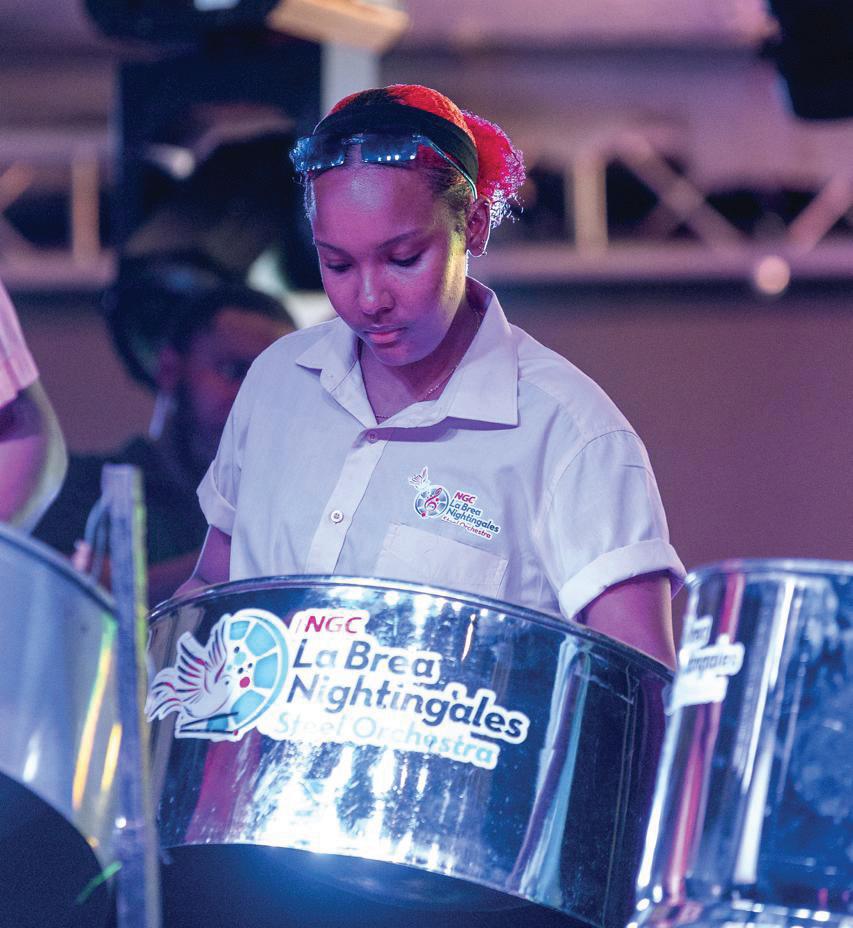
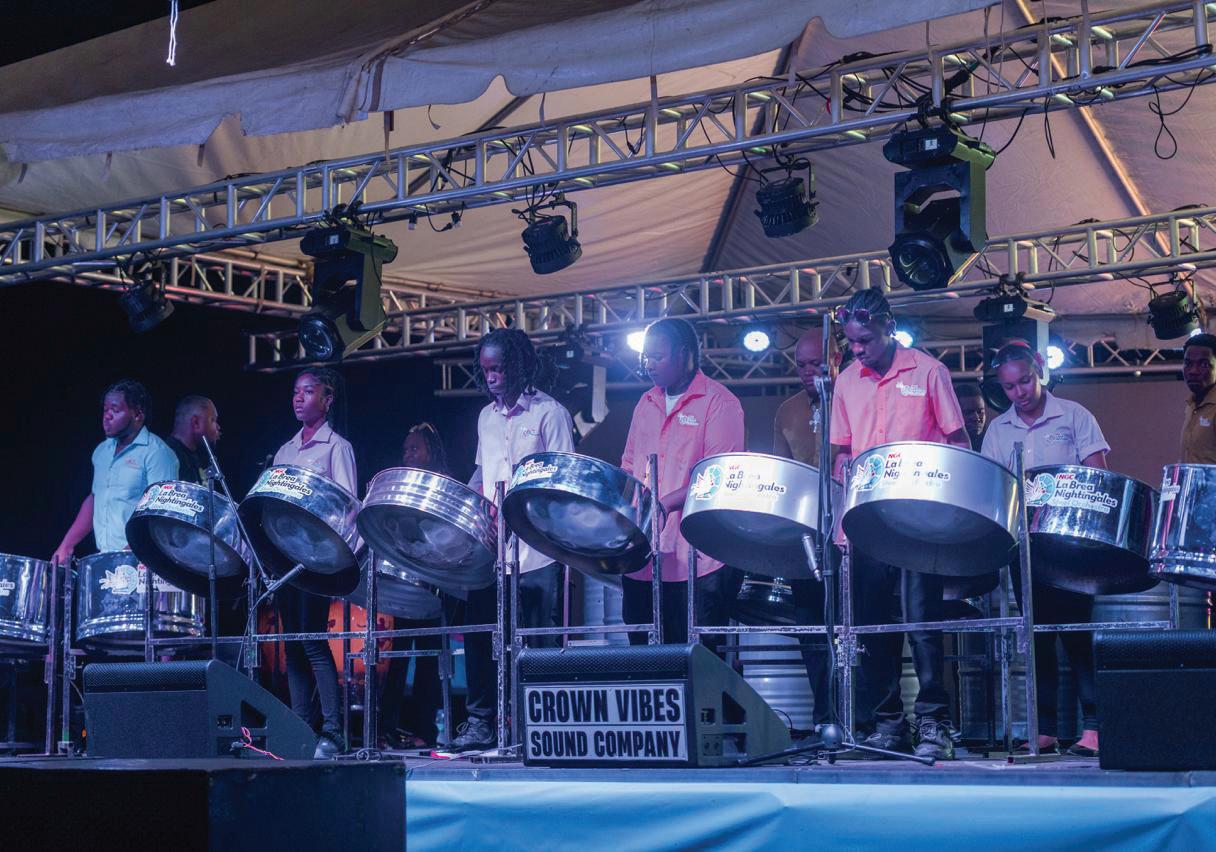

By Michel Outridge
JAMES Campbell was recently in the limelight for the role he played in the Reel Guyana documentary titled “Releasing the Giants: Saving Guyana’s endangered arapaima” as being one of the lead persons who was instrumental in saving more than 60 arapaimas that were trapped in drying ponds, lagoons, lakes and other body of shallow water.
James is a local of Apoteri Village, an Amerindian settlement in the northern part of Guyana located in Region Nine (Upper Takutu-Essequibo) between the Essequibo and Rupununi Rivers and it has a population of about 370 residents.
As a native of Apoteri Village, James told the Sunday Chronicle that he has no desire to relocate since he has lived there all his life and enjoy the simplicity of residing in a community that is farflung and has the potential to become a tourism destination apart from sport-fishing which is the major attraction.
James stated that Apoteri Village is accessible via river or trail which is 65 kilometers from the city via the Lethem

Road. A native, born and bred in the village, he is a Community Conservationist, Community Policing Group (CPG) Chairperson, and the Chairman for the village tourism.
He related that economically things are a bit slow in Apoteri Village and they depend on sport-fishing tourism to bring in an income but some locals also fish, hunt and cultivate cassava, banana and pumpkin to earn.
The father of seven emphasised his role as a re -
Andrew Tyndall, it represents a celebration of Caribbean music and has emerged as just one part of Guyana's flourishing tourism industry.
The festival featured performances from four distinguished steelpan groups, with three representing local talent while some of Guyana's best musicians took the stage. Tyndall, the event coordinator, emphasised that this eclectic mix was by design and resonated strongly with attendees.
"We had four steel bands, the Kunjaz Steelpan group, The Guyana Police Force Band, and the Pan Groove Steel Orchestra. We had one group from Trinidad, which was the La Brea Nightingales," he explained.
He further added, "Then we had a mixed medium band from the U.S. called Epic Tone, featuring pan, keyboards, drums, and bass player with percus-
source person in Apoteri Village, where he actively engages in initiatives to improve the lives of the community members. Campbell stated that he will continue to collaborate with others to rescue and rehabilitate arapaimas trapped in shallow waters, ensuring their safe return to the river to protect their population.
He noted that the recent wildfire significantly damaged the rainforest, forcing wildlife to move closer to the village in search of food and
shelter. While Campbell reported that the fire has somewhat subsided, some areas are still smoldering, which continues to impact the local wildlife and biodiversity.
He told the Sunday Chronicle that the rescue of the arapaimas is a combined effort and is no easy feat since they have to operate in a timely well-orchestrated manner to preserve the lives of the fishes. He said that Apoteri Village, under the guidance of Toshao Ozias James, will continue to de-
velop.
In addition to his deep involvement in the community tourism of Apoteri Village, Campbell is knowledgeable about tropical fish, particularly exotic aquarium species, and offers valuable hands-on insights into their characteristics.
He is also actively engaged in volunteer work within the village, working with local youth to educate them on the rescue of arapaimas.
James has managed to train a group 16-year-old school children as part of the collective rescue effort of trapped arapaimas in the dry spell that is currently affecting both animals and people across the country. The humid weather conditions, void of rainfall has created an unprecedented heatwave, much higher than usual and it is affecting humans, animals and crops.
James shared with the Sunday Chronicle that they are engaged in various conservation and community development projects, but they often struggle to secure the financial support needed to bring many of these initiatives to fruition.
He described the ongoing
dry spell as unpredictable, severely impacting local wildlife, especially monkeys, which are now seen staggering under the extreme heat in search of food and water, increasingly approaching residential areas in Apoteri.
The conservationist reported that a fire has been raging in the forest since March, destroying large sections of the previously undisturbed rainforest, with even the birds feeling the effects.
As a resident of Apoteri Village, James is committed to preserving the lives of animals, fish, and other wildlife, but he acknowledges that the community's efforts have their limits.
He is calling for partnerships to sustain conservation initiatives in the area. Having lived alongside these animals for so long, he finds it heartbreaking to witness the impact of climate change on their lives.
“We know the importance of wildlife and biodiversity because we reside in a natural nature setting and their contributions to our everyday life is vital and we would like the animals to remain endangered and live in their natural habitat without disturbance and suffering,” he said.
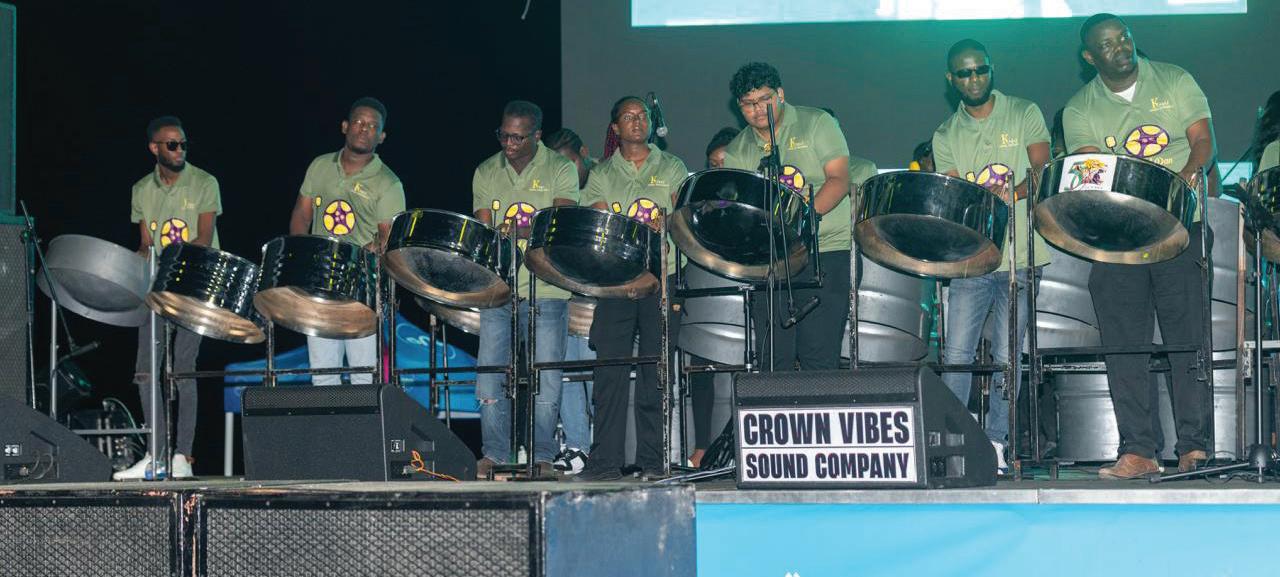
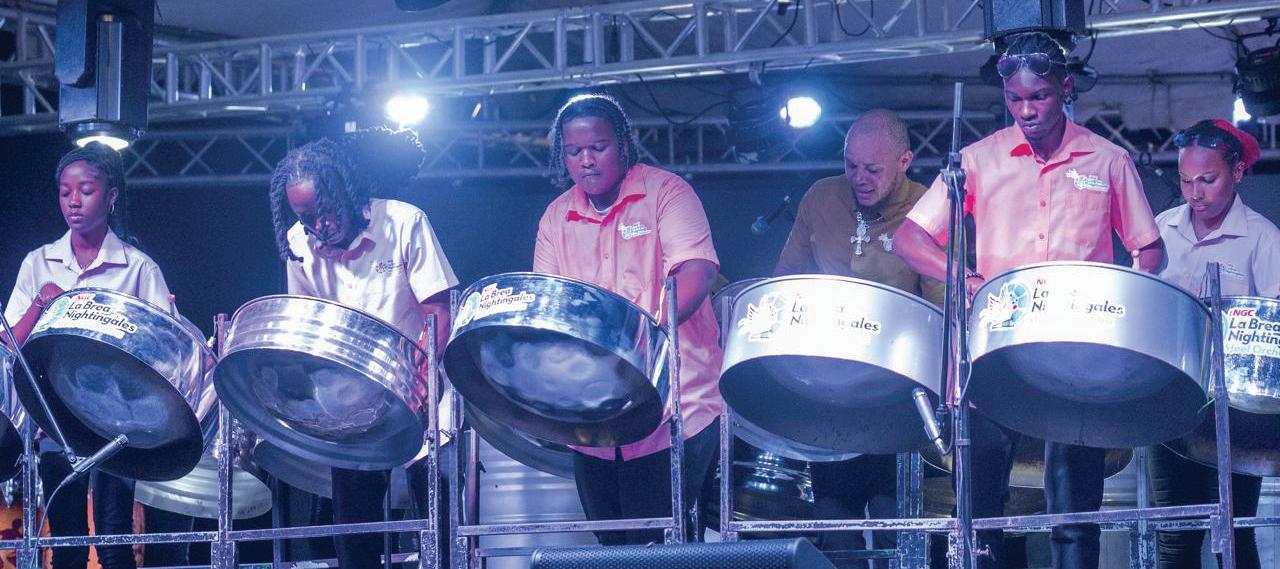
sion." The local talent was equally impressive, as Tyndall noted, "We had the Heatwave Band along with a brass quartet, and our local performers like Nekeita, Omaiah Hall, O.K.C., Calvin Burnett, and Adrian Dutchin." The event’s highlight came from a feature performance, from the Temperature band from Trinidad and Tobago,
As the festivities continued into the early hours of Friday, the crowd swelled with both locals and tourists who had come for Cricket Carnival. This mix of sports and culture is a
key strategy for Pan Brass and Soca, recognising that entertainment events play a crucial role in tourism development.
Tyndall explained that, "Entertainment is a huge part of determining the success of your tourism brand. People will come to see the Kaieteur Falls and bird watching, but, at the end of the day, they want to be entertained as well. They want to know a bit of your culture. These are the experiences that they will take back with them when they leave. So, organising events like these and the carnival in general provides an
opportunity for us to showcase our culture, offering visitors another aspect of the Guyanese lifestyle to soak up and enjoy. We see it as a very crucial contribution to our tourism product,” Tyndall said.
The electric atmosphere at Pan Brass and Soca was the result of considerable efforts by the organising team and their sponsors. With robust support from the Ministry of Culture, Youth and Sport, Republic Bank, One Communications, and newcomer Hess, the event
has evolved significantly since its inception three years ago.
Tyndall emphasised that the festival aims to reintroduce people to the immersive experience of Caribbean music, particularly steelpan. "When people come to an event now, yes, it's a concert, but they also want to have an experience.
The country's opening up, developing. People are travelling more, and when they go to events overseas, the experience starts the moment you reach the venue – from the decor to the
atmosphere. People now have that expectation when they come to events locally."
The vision for Pan Brass and Soca extends beyond entertainment. Tyndall and his team are committed to learning from regional counterparts and elevating Guyana's musical offerings. "I try to attend other events around the region, especially in Trinidad, to see what's new, how they're doing it, and how we can improve," Tyndall shared.
He also emphasised a broader mission. "It’s not just Pan alone. We're trying to reintroduce the brass band concept to Guyana. In the 60s and 70s, we were known for having topclass brass bands."
As tourism in Guyana continues to flourish, events like Pan Brass and Soca not only entertain but also create lasting memories for visitors, ensuring they come for more than just cricket.


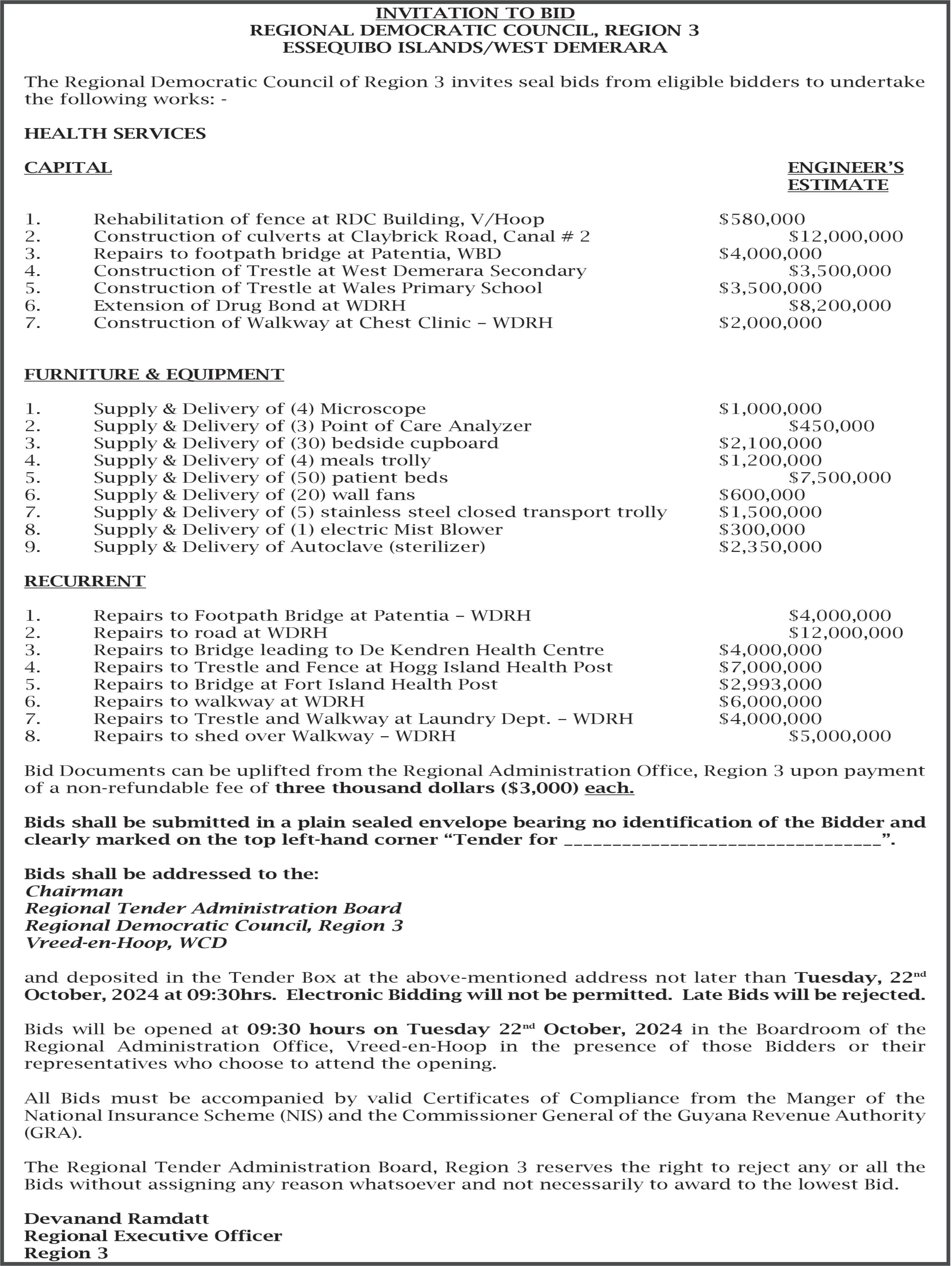






ALLYSA Healy’s Australia got off to a winning start with a comfortable victory over Chamari Athapaththu’s Sri Lanka in Match 5 of the Women’s T20 World Cup 2024 on Saturday.
Having restricted Sri Lanka to a modest 93/7 in the first innings, opener Beth Mooney anchored the chase as Australia eased to a six-wicket win in their first match of the tournament.
Megan Schutt (3/12) and Sophie Molineux (2/20) starred with the ball, and Australia’s deep batting lineup always looked in control with the bat, even with high temperatures clearly taking a toll, as Mooney’s unbeaten 38-ball 43* saw them home with 5.4 overs remaining.
The result leaves Sri Lanka with zero points after two matches, and in real trouble in Group A, with fixtures against India and
New Zealand to come.
Beth Mooney played the key hand with the bat, after three wickets left Australia with work to do after the powerplay in their chase of 94.
Alyssa Healy (4) and Georgia Wareham (3) went early, before Ellyse Perry lit a fire under the innings with a quick-fire 17 before being cleaned up by Suqandika Kumari, leaving her side at 35/3, still clear favourites, but not having it all their own way.
Fast scoring proved tricky for Australia, but with such a modest target, there was little pressure, and the game was effectively won by the time Ashleigh Gardner lobbed up a catch to depart for 12 (15).
And the match ended in a hurry as Phoebe Litchfield joined in with a run-a-ball 9, helping top-scorer Mooney (43*) to get to the winning
(Sunday, October 6, 2024)
COMPLIMENTS OF CUMMINGS ELECTRICAL COMPANY LTD
83 Garnett Street, Campbellville, Georgetown (Tel: 225-6158)
Answers to yesterday’s quiz: (1) SL Kings
(2) Johnson Charles (SLK)
Today’s Quiz:
(1) Who scored most runs for TKR in this season’s CPL?
(2) What was the highest individual score made by a TKR batsman this year?
Answers in tomorrow’s issue


post with more than five overs remaining, and with six wickets still in hand.
The Asia Cup Champions won the toss and opted to bat first, but were tied down in the powerplay, with Australia removing both openers cheaply and stifling
the run rate while the fielders were up.
Vishmi Gunaratne was the first to go, trapped in front by Megan Schutt after a struggle of an innings, departing for 0 (10).
And Australia bagged the key wicket of captain
and star player Chamari Athapaththu when Ashleigh Gardner had the all-rounder out lbw for just 3.
Sri Lanka looked to rebuild, but reached just 23/2 at the end of the first six overs, and Australia soon bagged a third wicket, Kavisha Dilhari also dismissed lbw, this time to Sophie Molineux.
Harshitha Samarawickrama ensured that Sri Lanka at least had a platform to hit off in the final overs, with the number three bedding down with a gutsy 23 from 25 balls. But Molineux returned to prize her out, luring the batter into a mistimed shot that offered a simple caught and bowled.
Nilakshika Silva (29* from 40) and Anushka Sanjeewani (16 from 15) ensured Sri Lanka got a score on the board, but scoring
continued to prove difficult, as Australia’s bowlers kept things extremely tight.
Georgia Wareham got in on the act, taking a wicket with a full toss that was caught superbly in the deep and given out after a review that used height tracking technology.
Sri Lanka closed on 93/7, leaving Australia with a gettable target, that they chased down with relative ease.
Sri Lanka realistically need to win both of their remaining matches to stand any chance of reaching the knockout stages out of Group A. India are next up for Athapaththu’s side, with the match scheduled for Wednesday in Dubai, with an encounter with New Zealand rounding out their group schedule on October 12. (ICC Media)
Mateo Kovacic scored twice as Manchester City overcame a dogged Fulham to pick up a first Premier League win in three games.
City dominated the early stages before Raul Jimenez's outstanding backheel cross enabled Andreas Pereira to score from close range.
Adama Traore missed two big chances either side of that - being denied by Ederson in a one-on-one and then skying a shot from inside the box.
And City midfielder Kovacic made him pay.
His first was a first-time effort from a half-cleared corner that went in via a deflection.
And his second, shortly into the second half, was a
much cleaner strike from the edge of the area.
There was almost a twist, as Traore beat Kyle Walker for pace before again shooting at Ederson.
In fact, City conceded several more chances before Jeremy Doku drifted in from the left and crashed a fantastic strike into the far top corner.
At that stage you thought surely City were home and dry but they left substitute Rodrigo Muniz free in the box to give Fulham renewed hope late on.
But Marco Silva's side could not muster an equaliser. City are now unbeaten in 50 home games in all competitions, the fourth English topflight side to ever manage th Kovacic gets City back on winning trail (just)
City fans unveiled a banner before kick-off in boss Pep Guardiola's native Catalan saying they want him to stay. His contract expires at the end of his season and he has been non-committal on his future.
It is an undeniable fact that Manchester City are a better team with defensive midfielder Rodri starting.
But since coming off, with a season-ending injury, at 1-0 up against Arsenal they drew that game and then were held by Newcastle in their next Premier League match.
Failure to win here would have meant three Premier League games without a win for the first time in 2024.
And for a while it was looking a real possibility.
If Traore had taken his chances it might have been 2-0 to Fulham, or even 3-0.
Kovacic and Ilkay Gundogan have been City’s double pivot since the injury to Rodri, effectively two men replacing one.
And while neither can compare to Rodri defensively, Kovacic ended up being the game's key player.
His first goal gave City a way back into the game - especially when it looked as if Fulham could score more - and his second to give them the lead came while fans were still making their way back from half-time refreshments.
Nearly everyone in the ground thought the game was won when substitute Doku struck a fantastic third from the edge of the box.
Kovacic's goals are nice but they lack that stable base without Rodri, and were left hanging on in injury time after Muniz struck.
This game has equalled the longest unbeaten run in their league history - 30 matches, level with their run from April 2017 to January 2018.
Fulham rue missed chances City boss Guardiola was full of praise for opposite number Marco Silva and the outstanding job he has done at Fulham before the game.
But Fulham traditionally struggle in this fixture. In fact they had lost their last 16 - now 17 - meetings with City, the longest losing run one English league side has ever had against another.
However the Cottagers caused City more problems than some of the world's best teams manage at Etihad Stadium.
Their opening goal was outstanding, with Jimenez's sensational backheel enabling former Manchester United player Pereira to score.
Traore's lack of end product probably cost him a career at the very top level with Barcelona - and this would have been a different game had he managed to take his chances.
Two one-on-ones ended up going straight to Ederson, and the other big chance was one he spooned over the bar from about 10 yards.
Fulham remain sixth in the table following only their second defeat of the seasonand Silva will have seen plenty of reasons to be confident here. (BBC Sport)
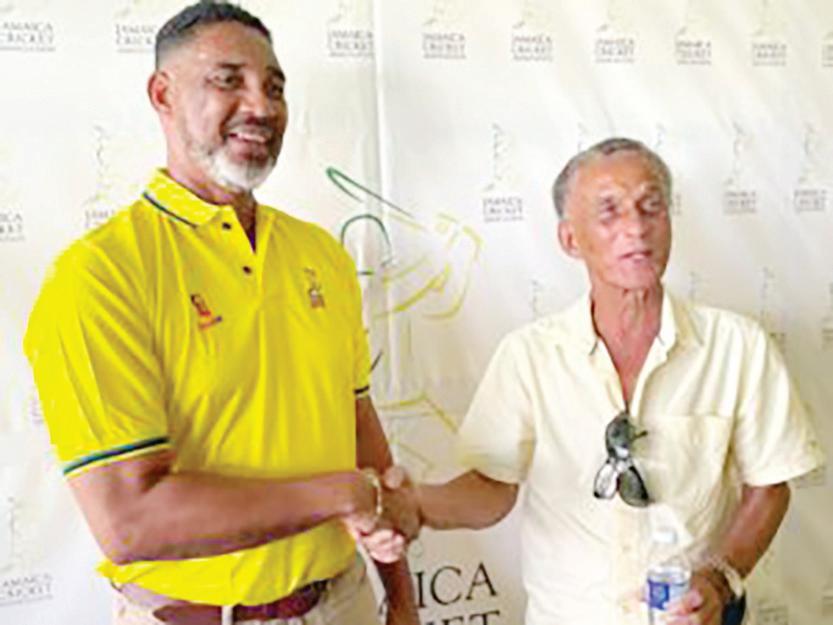
KINGSTON, Jamaica, (CMC) – Former Jamaica and West Indies leg-spinner Robert Haynes was officially named the new head coach of the Jamaica Scorpions at a press conference held in the President’s Box at Sabina Park on Wednesday last.
Haynes, who began his duties on October 1, returns to the role for the third time, replacing Andrew Richardson. His first stint came in 1998 when he led the Jamaica team to the Commonwealth Games in Malaysia, and he served as interim head coach in 2019 after replacing Robert Samuels.
The former West Indies selector will be supported by Jamaica U19 coach Terrence Corke as his assistant. The duo will prepare the Scorpions for their upcoming campaign in the Super 50 Cup.
One of Haynes’ primary goals is to revamp the team’s culture, and he has already pinpointed key areas that need attention.
“We need to change the way we practice,” Haynes explained. “The days of players coming in and batting for 15-20 minutes in the nets are behind us and that
approach just doesn’t work anymore.”
Haynes also emphasised the role of young cricketers in this cultural overhaul, stating that the future of Jamaica’s cricket depends on developing the next generation of players. Drawing from his experience as a former Jamaica U19 coach, he hopes to blend modern philosophies with his wealth of knowledge to bring success to the Jamaican franchise.
“One thing I’ll be introducing is more game-sense scenarios,” he added. “And we’ll be asking players for feedback which is going to be crucial as we move forward.”
“Within the next 12-16 months, we hope we can see a change in terms of where we want to go. We want the players to buy into the programme we have because if they don’t, it’s going to take longer. But it’s our job as coaches to let them realise that if you want to go to the international level, these are things you need to do.”
Haynes believes that the inclusion of assistant coach Corke, who has worked with many of the current Scorpi-
Ben Stokes has agreed a new two-year England central contract. Last year, the Test captain turned down a three-year deal when the England and Wales Cricket Board (ECB) offered multiyear contracts for the first time. Stokes signed on for just 12 months.
On Saturday, Stokes confirmed his new deal will take him through to 2026, including the away Ashes in Australia next winter.
The 33-year-old has been ruled out of England’s first Test against Pakistan with a hamstring injury.
England are in the process of offering new contracts and extensions to players, who will then decide whether or not to accept them.
Some 18 players signed multi-year deals 12 months ago, so remain under contract. The ECB introduced multi-year contracts mainly to ward off interest from franchise leagues.
Stokes was one of eight players who signed on for one year and are now out of contract.
ons players at the youth level, will be key to the team’s development.
“To get the best results, we needed someone who has been with the youth players, and that’s where Terrence comes in. His experience will help elevate the team,” Haynes noted.
The 59-year-old coach also praised the Jamaica Cricket Association’s (JCA) recent establishment of an elite coaching advisory board, which includes Chairman of Selectors Delroy Morgan and Talent Coaching Manager Junior Bennett.
Additionally, former Scorpions assistant coach Nikita Miller will head the new U15 pathway program, supported by Milton Thomas as his assistant.
JCA President Dr Donovon Bennett expressed his confidence in the new coaching team, highlighting their potential to deliver positive results.
“We’re expecting better outcomes. I’ve known Robert for a long time, and I’m happy to have him and his team on board. We’ll provide all the support needed to achieve success,” Dr. Bennett said.
explained Stokes was holding off on committing because a new memorandum of understanding was due to be agreed, potentially increasing the value of contracts.
The memorandum of understanding dictates the terms of contracts and is linked to the cycle of TV broadcast deals. A new broadcast cycle begins in 2025 and central contracts have been improved as a result.
Of the other seven players to sign one-year deals last year, James Anderson, Moeen Ali and Dawid Malan have all retired from international cricket, and Ben Foakes and Ollie Robinson have been dropped. Only Jack Leach and Reece Topley appear to be candidates for new contracts.
Jamie Smith and Shoaib Bashir are in line for central contracts for the first time after becoming regulars in the Test side. Jonny Bairstow still has a year left on his deal, despite not playing for England since the T20 World Cup in June.
At the time, England managing director Rob Key
England’s three-match series in Pakistan begins on Monday and Stokes will miss
a fourth Test since injuring his hamstring playing for Northern Superchargers at the beginning of August. Ollie Pope continues to deputise as captain.
England won 3-0 in Pakistan two years ago but are without the three pace bowlers who played on that tour. Aside from Anderson and Robinson, Mark Wood is injured.
In their absence, Chris Woakes will play his first Test in Asia since 2016, Gus Atkinson will feature in his first away Test and Brydon Carse makes his Test debut. It seems set to be a grueling challenge for England’s seamers. Though the Multan surface looks likely to have a green tinge, the temperature will be around 36 degrees.
“There are no doubts in my mind about the bowlers we have picked,” said Stokes. “We know they will be able to withstand that heat.
“It takes character and we have a lot of characters in our dressing room who will be willing to stand up to the challenge of playing Test cricket out here.” (BBC Sport)
SUPERBET is the latest entity to join the list of sponsors for this year’s edition of the Prime Minister’s softball three-day tournament, set to bowl off on Friday at several venues across Georgetown and East Coast.
On Friday at the business location, North Road, Georgetown, Superbet Operations Manager, Ashvani Kumar Pandey, disclosed that he was super excited to be associated with the softball mega event, assuring that he will continue contributing in the future.
President of the Georgetown Softball Cricket League (GSCL) Inc. Ian John expressed his deep appreciation to Superbet and particularly to Kumar Pandey for his sponsorship.
John pointed out that the support from Superbet is indeed welcome and promised that the tournament will be fascinating and thrilling from ball one.
The men will battle in three categories (20 overs): Legends (Over-50), Masters (Over-40) and Open (AllStars) while the women’s

division, which comprises 12 teams, will be 15-over knockout contests.
All three winners in the men’s category are guaranteed G$600,000 while the runners-up will cart off $100,000. Winners of the women’s category will take home $200, 000 and the runners-up $50,000.
Several incentive prizes, including Most Valuable Players (MVPs) in the final and tournament will also be up for grabs.
The tournament, which is in its eighth year, is being organised by the GSCL Inc. in collaboration with the Office of the Prime Minister and Ministry of Culture, Youth and Sport.
Matches are slated to be played at the at GCC, DCC, Police, QC, GYO, MYO and Lusignan Community Centre ground, East Coast, Demerara. All the finals will be played at the Police Sports Club ground, Eve Leary on Sunday, October 13.
TORONTO Rhinos Cricket Club defied the odds to emerge winners of the Elite Division when the Scarborough Cricket Association (SCA) 2024 final took place at the newly renovated Ajax Cricket Club ground last Sunday.
Having already defeated archrivals Invaders Cricket Club in the semi-final, the team responsible for them finishing as runners-up in the 2023 Premier Division, Rhinos made easy work of Ambassadors Sports Club in the final, winning by the huge margin of 107 runs.
The victory also meant Rhinos achieved the feat in their first year in the Elite Division, after being promoted this year.
Needing 201for victory, after limiting Rhinos to 200 all out in 46.2 overs in the 50-over affair, Ambassadors were shut out for a meagre 93 in 23.4 overs.
Opener Richard Dias top-scored for Ambassadors, hitting two fours and a six in his 40 and apart from Kavian Naress, who scored a defiant 24, the rest of the batting folded to the varied Rhinos bowling attack.
Bowling for Rhinos, Rishabh Singh claimed three for 23, Sajan Sissodiya two

for none in his lone over and Amir Khan one for 24 in five.
Earlier, Rhinos were indebted to Vivek Dabholia who hit three fours in his 48, skipper Khan whose 47 contained five fours and one maximum and Muhammad Ultaf who spanked a quickfire 33 off 25 balls, aided with two fours and two sixes. Opener Arjun also contributed a valuable 27 (two fours and two sixes).
Shuaib Alam Zaidi was Ambassadors best bowler
with four for 33 in 9,2 overs while Durand Soraine supported with three for 42 from his full quota of 10 overs.
In the semi-final encounters, played the previous day, Rhinos won from Invaders while Ambassadors got the better of Highland Creek in a close contest.
Set 171 for victory, after Invaders were restricted to 167 all out in 41.3 overs, Rhinos raced to 170 for five in 27.5 overs with Ultaf plundering three fours and seven sixes in an unbeaten
63 off 28 balls. Highland Creek batted first and were bowled out for 188 in 39.4 overs. Hassan Khan hit a top score of 59. Kurt Ramdath finished with the remarkable figures of four for nine from seven overs while Emile Rajah took four for 34 from 10. Ambassadors reached the required target in 46 overs, losing eight wickets in the process. Naress was undefeated on 63 (four fours) when victory was achieved.
At the presentation
ceremony, SCA President, Guyana-born Shiv Persaud congratulated both teams on reaching the final. He also had special praise for Rhinos for winning the title on their first attempt. Persaud also reminded the players that the annual presentation, dinner and dance will be held at the Grand Cinnamon Banquet Hall in Markham on Saturday, November 23.

HEATHER Knight’s England got their tournament off to a winning start with victory over Bangladesh in Group B at the ICC Women’s T20 World Cup 2024.
England’s four-pronged spin attack combined to deny Bangladesh in a low-scoring thriller in Sharjah.
The Group B favourites picked all four of their leading spinners, and the quartet were put to work after England could only set a target of 119, with a batting effort that fizzled out after a 48-run first-wicket stand.
Danni Wyatt-Hodge topscored with 41 for England, but it was the Bangladesh bowlers who shone as evening turned into night in Sharjah, with Ritu Moni, Fahima Khatun and Nahida Akter picking up two wickets apiece in an excellent team effort.
And ball continued to dominate during Bangladesh’s chase, with only Sobhana Mostary showing any fluency with a knock of 44 that made England sweat
a little in the heat of the UAE evening.
Linsey Smith was the stand-out bowler, taking 2/11 from her four overs, while Charlie Dean 2/22, Sarah Glenn 1/22 and Sophie Ecclestone all contributed to limit the scoring, as England sent down 16 overs of spin in the innings.
Charlie Dean and Linsey Smith removed openers Dilara Akter (6 from 12) and Shathi Rani (7 from 9) in a slow start, and a recovery partnership between Sobhana Mostary and Nigar Sultana left the Tigresses on 42/2 at the midway point of their chase, needing to up the scoring rate, but with plenty of wickets still in hand against the favourites to qualify from the group.
But the spin brilliance of England strangled the scoring rate, leaving too much for Bangladesh’s middle order to do.
Mostary gave it her best shot, rotating the strike superbly in her 48-ball 44. But
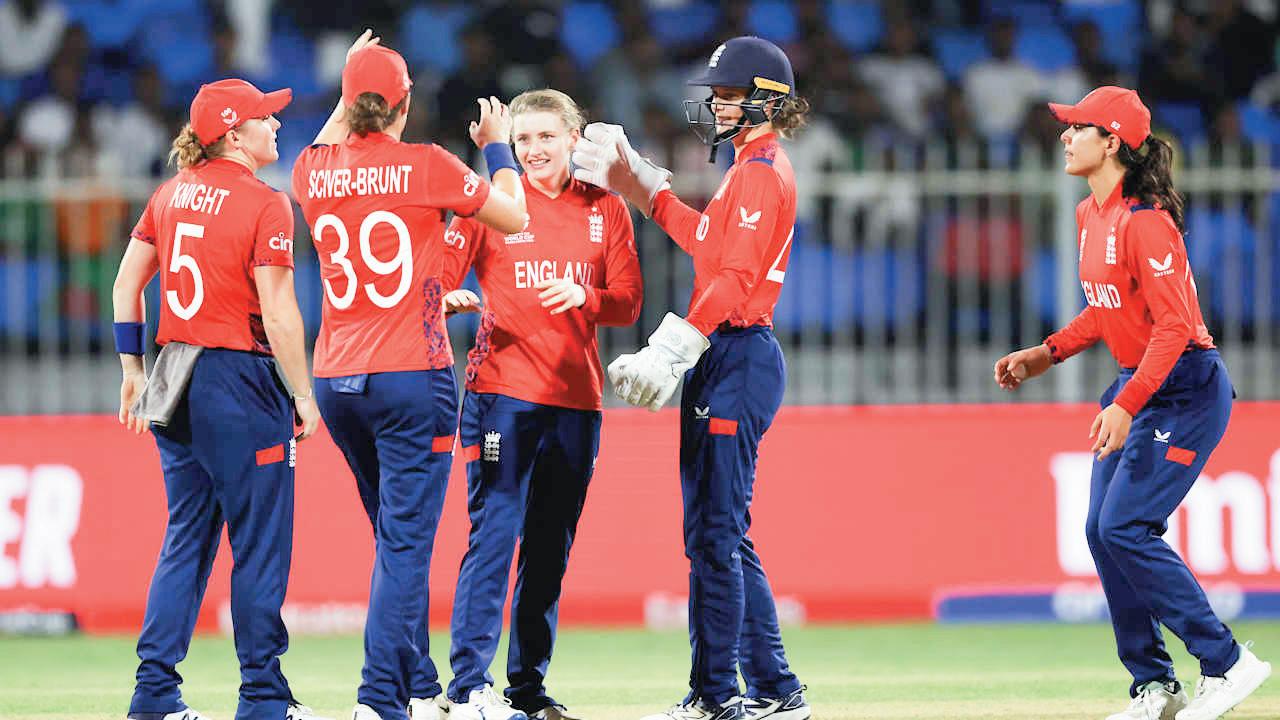
England players celebrate the fall of a wicket
England’s spinners picked up wickets frequently enough to deny any momentum in the chase.
Glenn, Smith and Nat Sciver-Brunt picked up a wicket apiece to keep England on top, and the game was effectively done when Dean trapped Mostary infront with nine balls remain-
ing. Bangladesh closed on 97/7, still 21 runs short of their target.
Earlier, England’s openers made a strong start after Heather Knight’s World Cup started with the correct call at the toss as England chose to bat first in the evening game.
Maia Bouchier and Danni
Wyatt-Hodge played through the powerplay scoring at a rate that few teams have looked capable of doing on the Sharjah surface, with the score at 48/1 when Bouchier was caught for 23 (18).
But Bouchier’s wicket prompted a slow-down as Bangladesh got themselves into the game, prizing out
the key scalps of Nat Sciver-Brunt (2) and Heather Knight (6) – the latter cleaned up by a beauty from Ritu Moni.
Wyatt-Hodge’s sparkling knock ended short of a half-century as she was stumped for 41 off Nahida Akter and Alice Capsey struggled to get going in an innings of 9 (17), leaving England needing their lower middle order to boost the total to one they’d have been hoping for after opting to bat first.
Fahima Khatun returned outstanding figures of 2/18 from her four overs.
Rabeya Khan played a big part in England’s slow down, with 1/15 from her four, but the batters weren't quite able to complete the job in the second innings.
Bangladesh will now turn their focus towards a crucial clash with West Indies in their next match on Thursday, while England make a return to action on Monday against South Africa. (ICC Media)
THE National Sports Commission (NSC), following an extensive and consultative process, has finalised a 140-member contingent that will participate in the 2025 edition of the Inter-Guiana Games (IGG), which is slated for Cayenne, French Guiana, from October 24th-26th.
The selection process for the annual event, which lasted for several weeks and was aided by the IGG Management Committee, was staged in collaboration with stakeholders.
The final roster, which will make the trek to the French department, comprises athletes, officials, and auxiliary personnel. Presently, the list has been submitted to the French authorities for the acquisition of visas and any other relevant or requisite travel documents.
The IGG Management Committee contains Chefde-Mission Dr Karen Pilgrim and veteran sports administrator Gervy Harry, Vice Chairperson of the NSC Cristy Campbell Assistant Directors of Sport Melissa Dow-Richardson and Frankie Wilson among other individuals. The entity meets twice a week to finalise the logistical arrangements for the team. They will meet on an in -
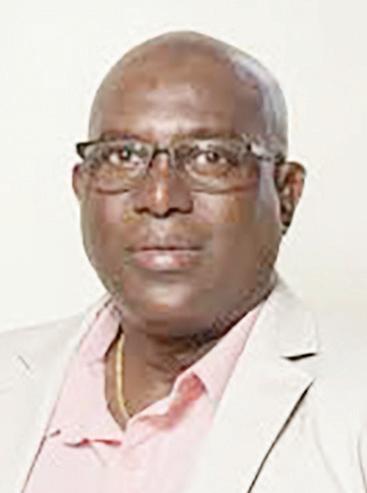
creased basis as the date for the team’s departure draws closer.
The seven disciplines that will be contested are: athletics, basketball, beach volleyball, chess, futsal, swimming, and table tennis. Owing to the distance that must be travelled, Guyana is slated to arrive in the French territory on the 22nd, while their return date is penciled for the 27th. Suriname is slated to arrive on the 23rd.
Meanwhile, Director of Sport Steve Ninvalle said, “Given the cultural importance of the tournament, an extensive process was conducted and aided by the IGG Management Committee in conjunction with the local associations to select the best possible and available athletes and personnel
for this prestigious regional championship.
This annual undertaking is a covenant amongst culturally and historically linked people and community and will continue to survive the test of time given our shared values and, more importantly, our ambition to forge closer and deeper bonds.”
He further said, “Guyana is expected to host the 2025 edition, and given its unquestionable importance, a world-class experience will certainly be realised owing to the ongoing development and refurbishment of faculties and venues by the Government of Guyana as it strives to usher in a sporting cultural revolution. That is the vision of His Excellency President Dr. Irfaan Ali, whose commitment to achieving this objective is evident by the annual increasing largesse, which is of historic proportions, that is afforded to the sector.”
Originally held in 1967, the IGG is traditionally an annual competition among the territories of Guyana, Suriname, and French Guiana. The previous edition was staged in Suriname, with Guyana hosting the 2022 edition following a fiveyear hiatus owing to the COVID-19 pandemic.
nis-elbow injury, but he has worked his way around that this season, dovetailing well with Johnson Charles, who has reinvented himself as a 360-degree batter.
While this is the St Lucia franchise's third CPL final, this will be du Plessis' first - he had suffered an injury before the title clash in 2021, when they lost to St Kitts & Nevis Patriots. However, he is used to the pressure that a final brings, having been part of Chennai Super Kings for a number of years in the IPL. Kings' coach Daren Sammy also has some unfinished business: in his last match as CPL captain, he lost to Trinbago Knight Riders in the 2020 final. Can he
and du Plessis upstage Amazon Warriors at their home ground and lead Kings to their first CPL title?
In the spotlight: Moeen Ali and Alzarri Joseph Just over three months after not bowling in England's T20 World Cup semi-final defeat to India in Providence, Moeen Ali is now on the verge of winning a title, in his first CPL stint, at the venue. He has bagged 14 wickets in nine innings at an average of 11.35 and an economy rate of less than five. With the bat, he has floated up and down the order and in the qualifier 2, he scored an unbeaten 44 to put Amazon Warriors in the final. In another spin-dominated CPL, Alzarri Joseph is the
DUBAI, United Arab Emirates, (CMC) – West Indies Women’s skipper Hayley Matthews says the team has assessed its mistakes in the opening loss to South Africa and will look to improve on those areas when then take on Scotland on Sunday in their second match of the Women’s ICC T20 World Cup here.
The Caribbean side went down to the Proteas by 10 wickets on Friday in a hugely disappointing performance.
Matthews acknowledged that the West Indies failed in both the batting and bowling departments in that contest and revealed that the team had spoken about it in detail.
“We had some thorough discussions yesterday evening after the match and obviously, it’s one of those games that you want to be able to put it behind you, so we try to have those discussions as early as possible,” Matthews told reporters in a pre-match press conference on Saturday.
“We all knew we didn’t get enough runs on the board and kind of just tried to break down why that was.
“Then in the bowling department, obviously not getting to take wickets as well, but we had thorough discussions about how we could build better partnerships and also find ways to increase our strike rate,” she added.
Matthews said it was important for batters to be able

to increase the scoring rate during the innings if the West Indies were to post formidable totals at the World Cup.
“At some point in the game we felt like we got to a period in the game after losing early wickets where Stafanie Taylor and Shemaine Campbelle were able to rebuild really well, but we weren’t able to kick into that second gear to get a bigger score,” she said.
Matthews, who only scored 10 in that opening game, said she was also hoping for a big score against Scotland to help give her some momentum.
“I feel like I want to score every time I go out on the pitch…and I would love to have a good go against Scotland and take that form into the rest of matches,” she said.
However, the West Indies may be without the services
of veteran Stafanie Taylor, who has not fully recovered from an apparent leg injury she sustained against South Africa.
In giving an update, Matthews said Taylor was still being looked after by the medical staff and did not train with the squad on Saturday.
“They’re taking good care of her at the moment. Not sure how fit she will be for tomorrow, might be on the field or might not be,” she said.
On a more positive note, Matthew said Zaida James, who was hit in the face, should be fully recovered to go against Scotland.
“Zaida is talking a lot better today. Last night she was mumbling a few words, but I think she will be alright. She’s a tough girl,” she said.
most successful fast bowler with 15 wickets in 11 innings. His ability to hit hard lengths and generate extra bounce have served him well, and on potentially slow surfaces in Guyana, he could take the conditions out of the equation and provide a point of difference to Kings' attack. Du Plessis, too, trusts Alzarri to bowl the tough overs, having also worked with him at the SA20 (Joburg Super Kings) and IPL (Royal Challengers Bengaluru).
Team news: Who will open the batting for GAW?
Since the start of CPL 2023, Amazon Warriors have used 14 openers with only Rahmanullah Guraz and Saim Ayub, who has missed this
season for national duty, getting more than five innings each at the top. It remains to be seen if Moeen will open alongside Gurbaz again in the final on Sunday. Amazon Warriors will also have to make a choice between the fingerspin of Kevin Sinclair and the pace of Shamar Joseph.
Guyana Amazon Warriors (probable): 1 Rahmanullah Gurbaz, 2 Moeen Ali, 3 Shai Hope (wk), 4 Shimron Hetmyer, 5 Romario Shepherd, 6 Keemo Paul, 7 Dwaine Pretorius, 8 Raymon Reiffer, 9 Kevin Sinclair/ Shamar Joseph, 10 Gudakesh Motie, 11 Imran Tahir (capt) Will Kings stick with Johann Jeremiah, who had made
his CPL debut in Qualifier 1, or will they go back to Shadrack Descarte?
St Lucia Kings (probable): 1 Faf du Plessis (capt), 2 Johnson Charles, 3 Roston Chase, 4 Ackeem Auguste, 5 Tim Seifert (wk), 6 David Wiese, 7 Johann Jeremiah/ Shadrack Descarte, 8 Matthew Forde, 9 Alzarri Joseph, 10 Khary Pierre, 11 Noor Ahmad Pitch and conditions: Spin to win?
Though the Providence pitch used for the last two games against Kings saw the ball come on to the bat better, the venue has traditionally rolled out slow tracks. Rain had interrupted Amazon Warriors' chase in the first qualifi-
er and though rain has been forecast for Sunday morning as well, the forecast is more promising for the evening. Dew could be a factor later in the night.
Quotes "We gelled well together last year, and we knew we had to work hard to win the competition. Coming back and defending the title is a bigger challenge."
Guyana Amazon Warriors captain Imran Tahir "I feel like we've adapted well wherever we've played, bar two games at home where he were a little bit slow on reacting to those conditions."
St Lucia Kings captain Faf du Plessis. (Espncricinfo)


AFTER having had to wait 11 years for a maiden CPL trophy, Guyana Amazon Warriors are now just one step away from winning back-to-back titles. Imran Tahir was targeted when he was appointed Amazon Warriors' captain last season at 44 - Tahir said "everyone was sending jokes" about it - and having been retained as captain this year, he will be looking to lead Amazon Warriors to glory once again today, in front of their home fans, in Providence.
...All eyes will be on the weather and the pitch in Providence, as Amazon Warriors look to defend their title

At 45, Tahir became the first overseas bowler to 100 wickets in the CPL and continues to rock the league with his variations and celebrations. He had joined Amazon Warriors in 2018 and has remained with the side for seven seasons, which is quite rare in the cutthroat world of franchise T20 cricket. Midway through this season, Tahir suffered an injury, but he recovered to forge a potent partnership with Gudakesh Motie, the local left-arm fingerspinner, and Moeen Ali, the English offspinner. The trio has been hard to get away, especially on the spin-friendly surfaces in Providence.
KENTUCKY Fried Chicken (KFC) Mini Zinger Cricket programme commenced at the Georgetown Cricket Club (GCC) ground, yesterday.
The programme will be held on Saturday mornings from 08.00 hours to 09:30 hours and GCC president, Johnaton Yearwood, informed that the opening day went very well.
“We had 24 children including one girl but we have catered for 50 children so we hope more turn up when the session is held this Saturday” Yearwood disclosed.
Coaching was supposed to be conducted by GCC’s Head Coach, former Guyana youth opener, Peter Persaud and Guyana Harpy Eagles Assistant Coach, former Guyana off-spinner, Garvin Nedd.
The aim of the programme is to create a developmental system for preteen children interested in becoming cricketers.
There is no registration fee. (Sean Devers)
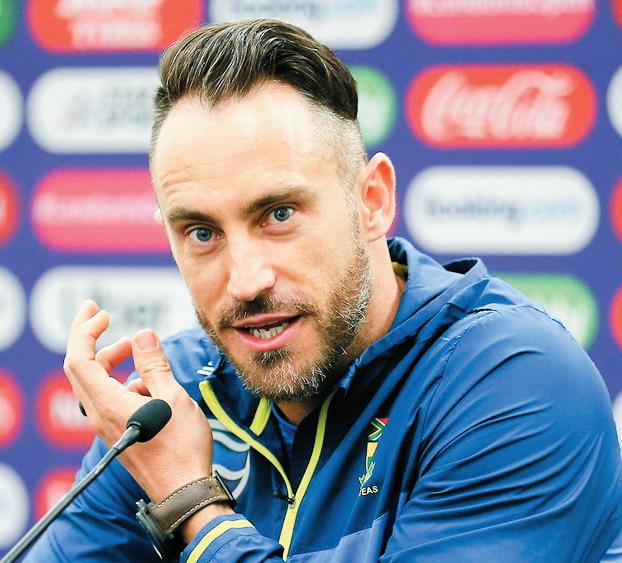
Amazon Warriors have also loaded their side with spin-hitters like Shimron Hetmyer, Shai Hope and Moeen. After not playing a single game in the 2024 T20 World Cup,
Hetmyer has reminded the world of his T20 pedigree, hitting 391 runs in 12 innings at an average of 43.44 and strike rate of 187.98 in this CPL heading into the final.
Since the start of CPL 2023, Amazon Warriors have lost just four games at home, with two of those losses coming at the hands of St Lucia Kings, including the Qualifier 1 earlier this week. Despite losing tosses and losing key personnel - like Heinrich Klaasen even before the start of the tournament - Kings have remained a formidable force under Faf du Plessis, who, like Tahir, is a familiar face at the CPL.
At 40, du Plessis is still going strong. This is his most prolific CPL in terms of runs - 384 runs in 11 innings at an average of 38.40 and strike rate of 148.83 - and if it culminates in a title, it could potentially raise his stocks ahead of the IPL retention deadline and player auction. Du Plessis' stint in CPL 2023 was cut short by a ten-
